Frank Herbert's 1965 sci-fi novel Dune gets a new film adaptation—this one helmed by Denis Villeneuve (Arrival, Blade Runner 2049)—later this month. But before Ars Technica reviews the movie, there's the matter of its predecessor: 1984's Dune, made by a then up-and-coming filmmaker named David Lynch.
Detractors call Lynch's saga—a tale of two noble space families 8,000 years in the future, fighting over the most valuable resource in the universe amidst sandworms the size of aircraft carriers—incomprehensible, stilted, and ridiculous. It lost piles of money. Yet fans, especially in recent years, have reclaimed Lynch's film as a magnificent folly, a work of holy, glorious madness.
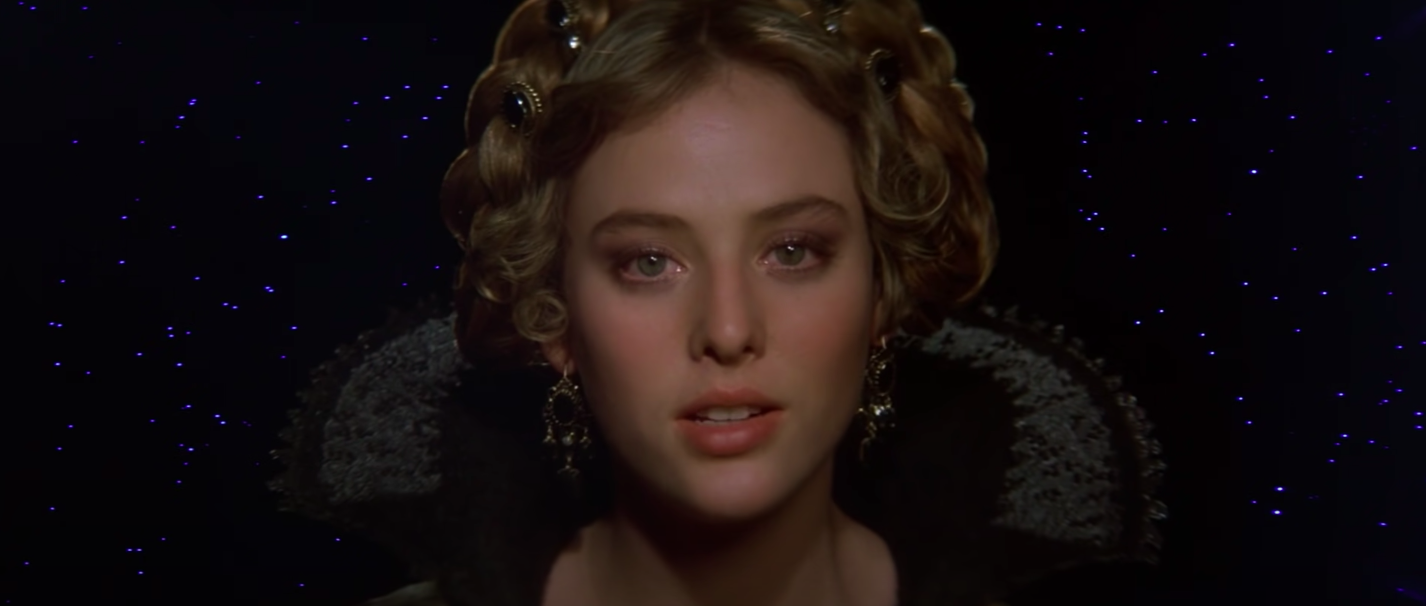 Lynch begins Dune where his previous film (The Elephant Man) ends: a starfield. The Emperor's daughter (Virginia Madsen of Sideways) fades in to bring us up to speed. She doesn't appear again for nearly 2 hours and, when she does, she doesn't say or do anything.
Lynch begins Dune where his previous film (The Elephant Man) ends: a starfield. The Emperor's daughter (Virginia Madsen of Sideways) fades in to bring us up to speed. She doesn't appear again for nearly 2 hours and, when she does, she doesn't say or do anything.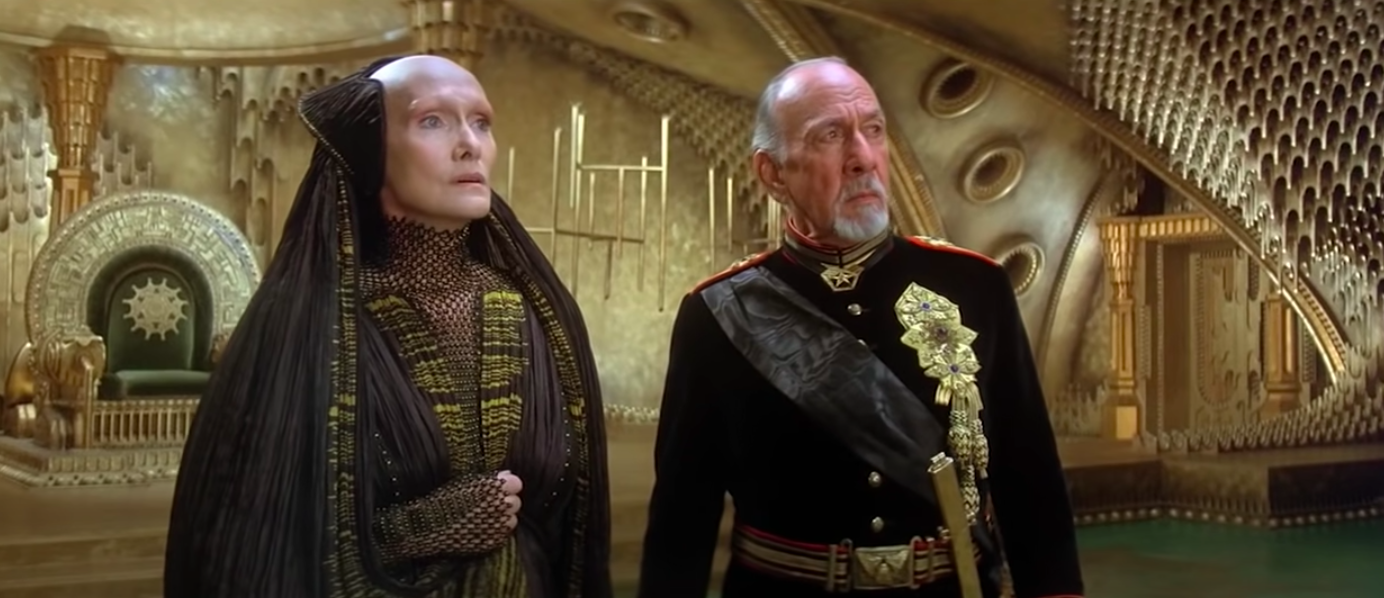 Jose Ferrer is more subdued than the moniker "Emperor of the Known Universe" might lead you to believe. His son Miguel was on Twin Peaks. Siân Phillips plays his personal space nun.
Jose Ferrer is more subdued than the moniker "Emperor of the Known Universe" might lead you to believe. His son Miguel was on Twin Peaks. Siân Phillips plays his personal space nun.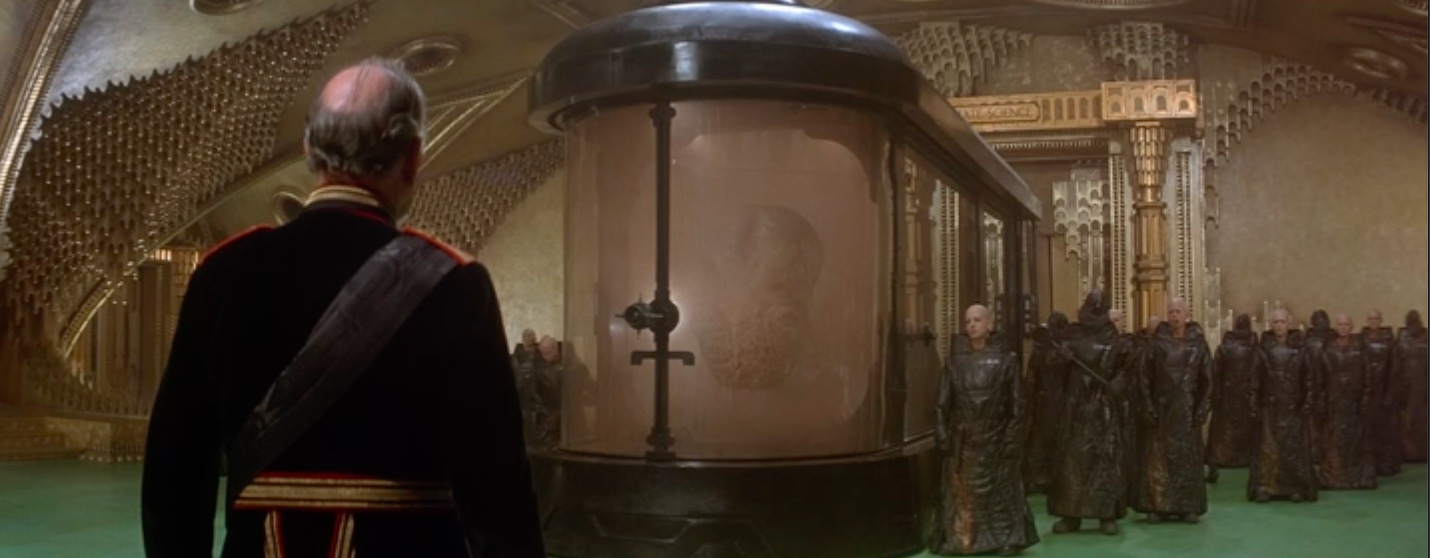 The Emperor talks to a Guild Navigator. Look at that set. Your ranch-style two-story in the exurbs doesn't seem so fancy now, does it?
The Emperor talks to a Guild Navigator. Look at that set. Your ranch-style two-story in the exurbs doesn't seem so fancy now, does it?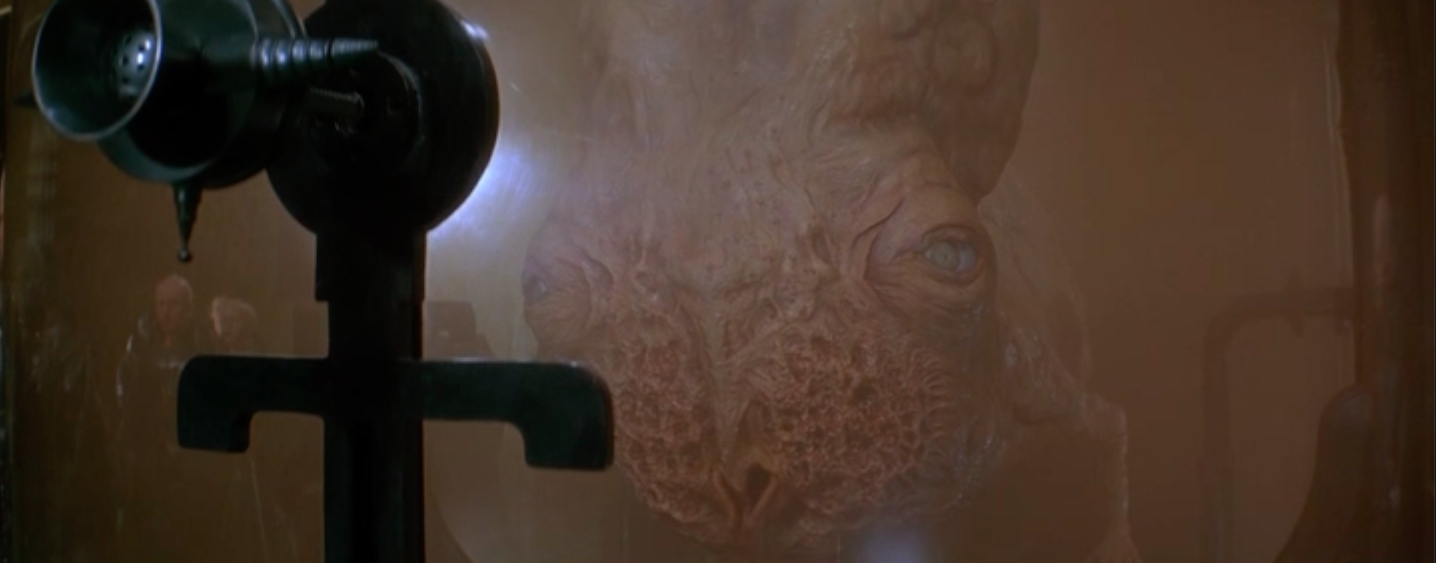 The Guild Navigator started out as a regular human but has been mainlining the Spice for a thousand years or something. He can fold space but probably can't get a date.
The Guild Navigator started out as a regular human but has been mainlining the Spice for a thousand years or something. He can fold space but probably can't get a date.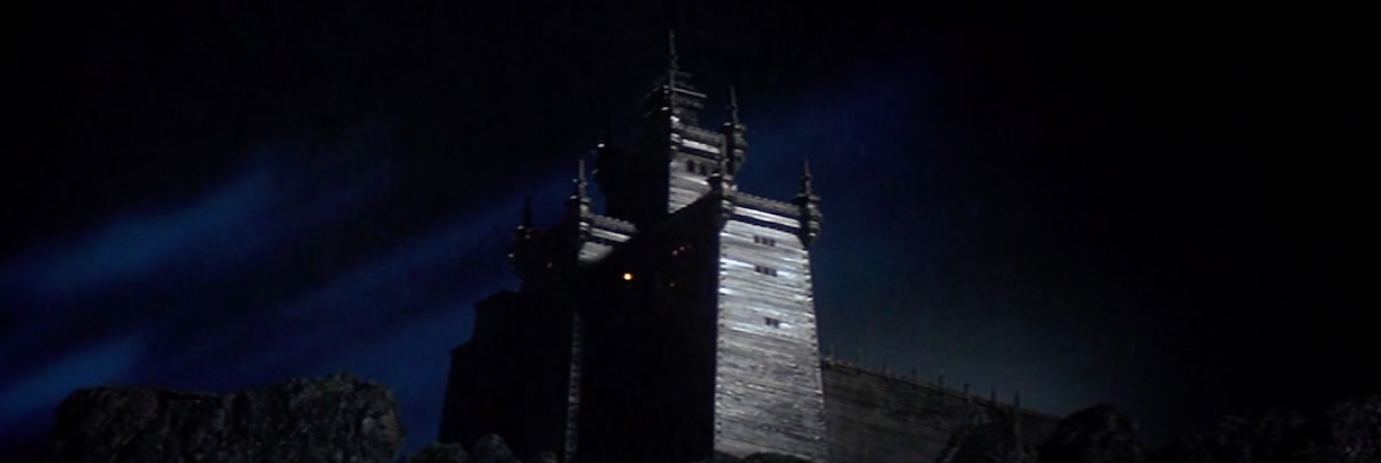 This is where the Atreides family lives. Long live models.
This is where the Atreides family lives. Long live models.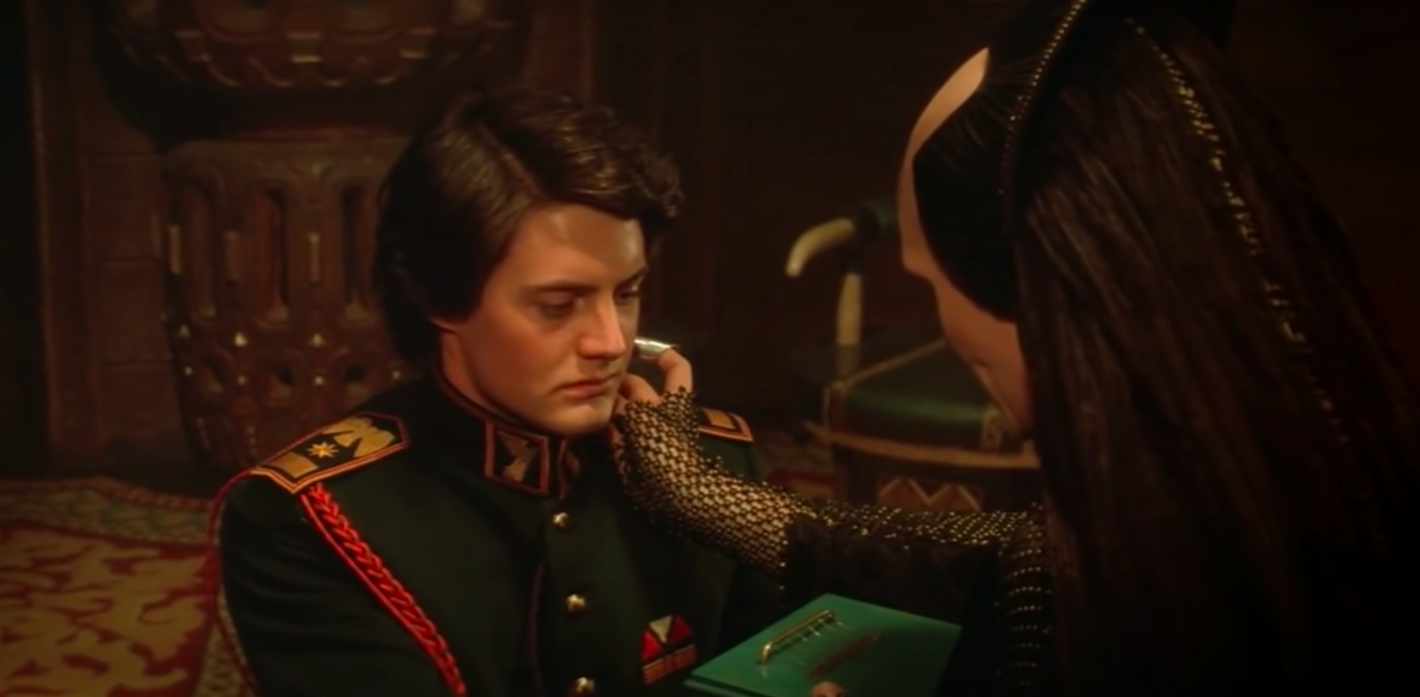 Paul (Kyle MacLachlan) has a tête-à-tête with the Emperor's space nun. Fear may be the mind killer, but that thing at his neck is the regular kind of killer. Phillips has more dialogue in this scene than in any other, but she gets in some grade-A sighing and moaning throughout, because Lynch loves showing older women with wild hair having meltdowns. She's why you hire great talents.
Paul (Kyle MacLachlan) has a tête-à-tête with the Emperor's space nun. Fear may be the mind killer, but that thing at his neck is the regular kind of killer. Phillips has more dialogue in this scene than in any other, but she gets in some grade-A sighing and moaning throughout, because Lynch loves showing older women with wild hair having meltdowns. She's why you hire great talents.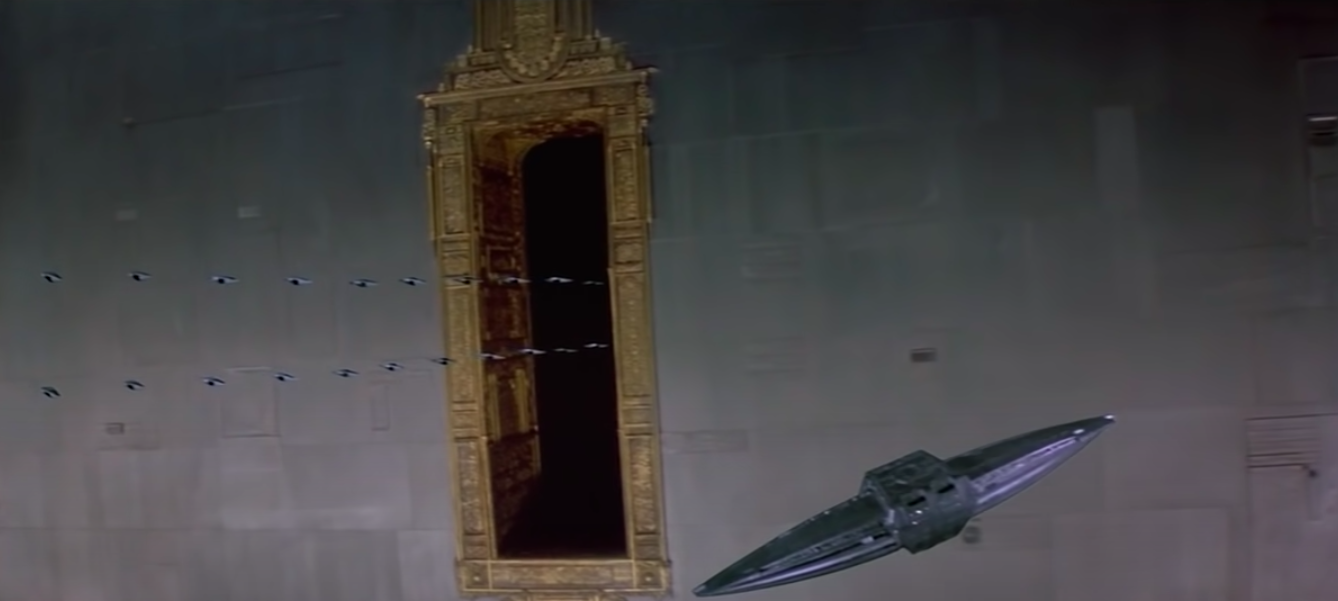 Little spaceships carry the Atreides and their entourage to a big spaceship for the journey to Dune. This whole space-travel sequence, like much of Dune, plays out like a ritual. See the docking bay where the spaceships are going in? I don't think this screenshot does justice to all the baroque decoration. Nothing says, "We've had space travel for thousands of years" like needless ornamentation.
Little spaceships carry the Atreides and their entourage to a big spaceship for the journey to Dune. This whole space-travel sequence, like much of Dune, plays out like a ritual. See the docking bay where the spaceships are going in? I don't think this screenshot does justice to all the baroque decoration. Nothing says, "We've had space travel for thousands of years" like needless ornamentation.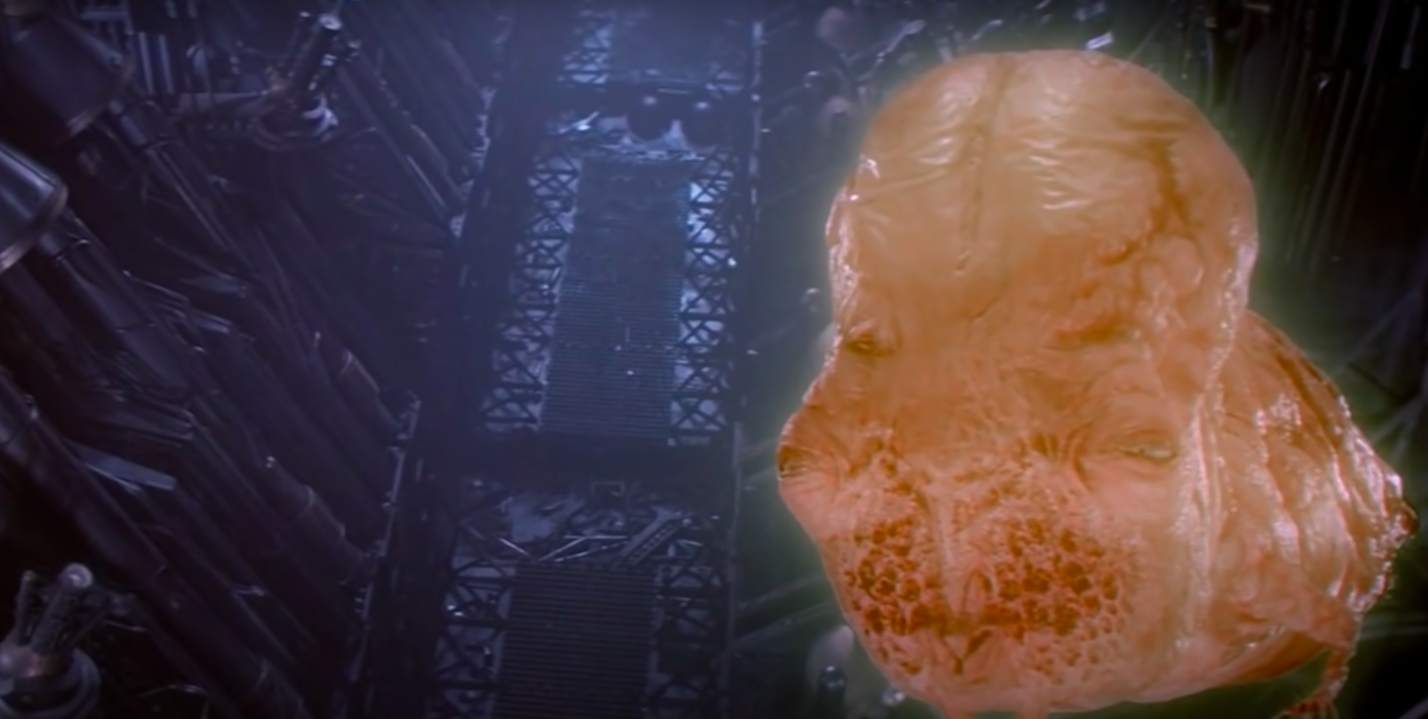 A Guild Navigator in his natural habitat. The Spice lets him move the Atreides' big spaceship.
A Guild Navigator in his natural habitat. The Spice lets him move the Atreides' big spaceship.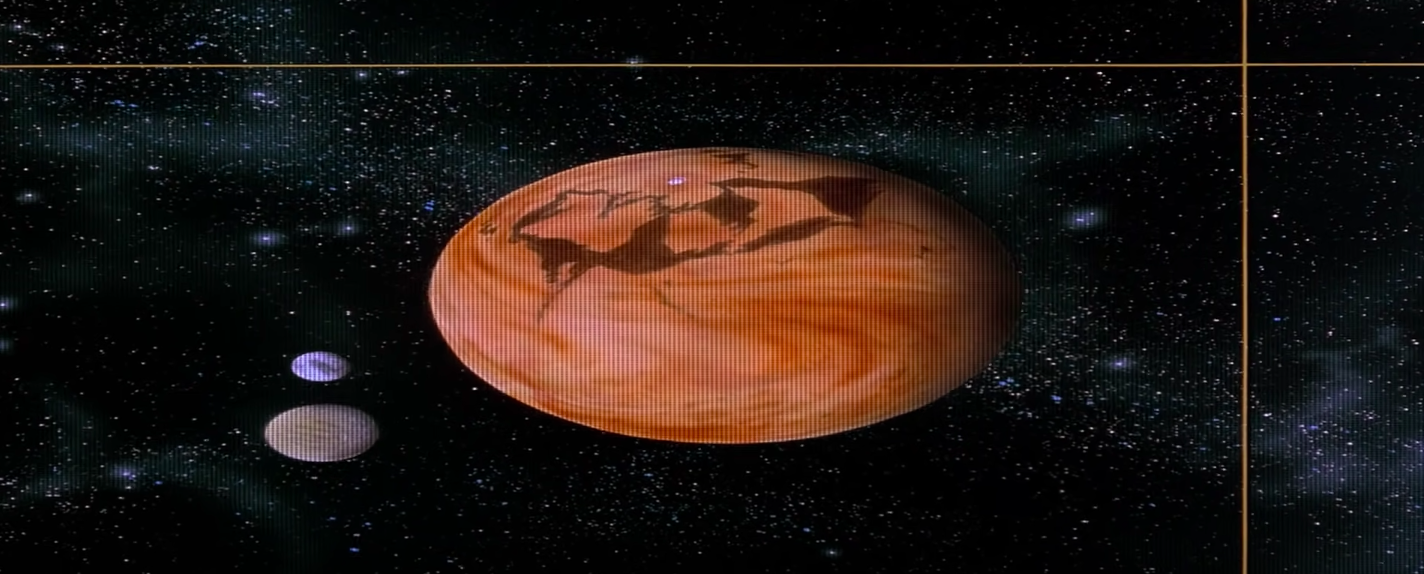 The Guild Navigator looks for Dune on his handy starchart. Complaining about dated special effects is like complaining when you see a Model T at a car show.
The Guild Navigator looks for Dune on his handy starchart. Complaining about dated special effects is like complaining when you see a Model T at a car show.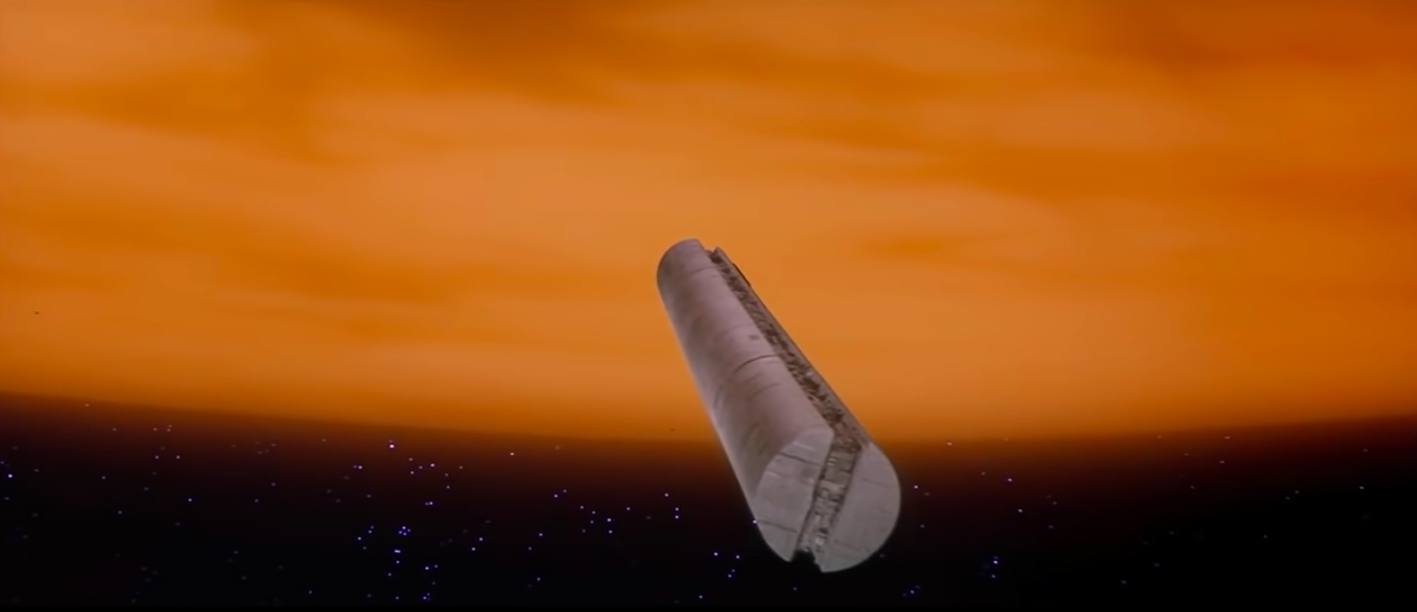 The big spaceship has been teleported to Dune. Note that it has no means of propulsion; it doesn't need any.
The big spaceship has been teleported to Dune. Note that it has no means of propulsion; it doesn't need any.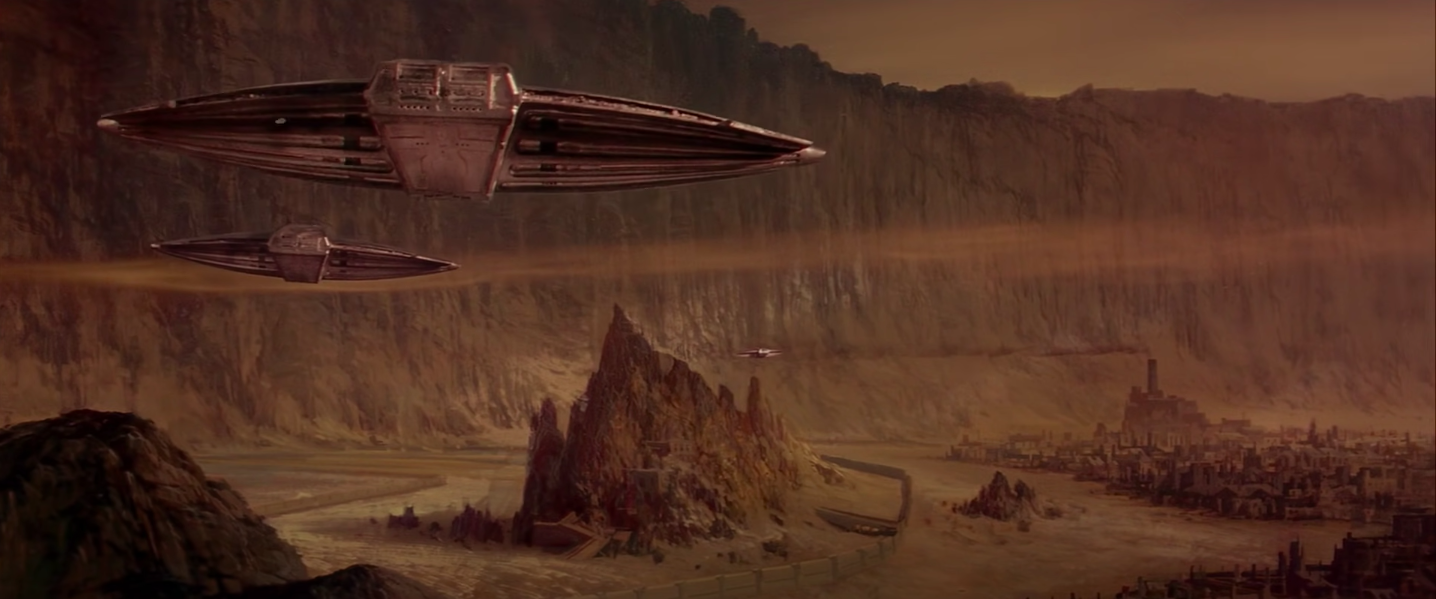 Small spacecraft bring Atreides to the surface of Dune. The little ships look kind of like birds with their heads cut off.
Small spacecraft bring Atreides to the surface of Dune. The little ships look kind of like birds with their heads cut off.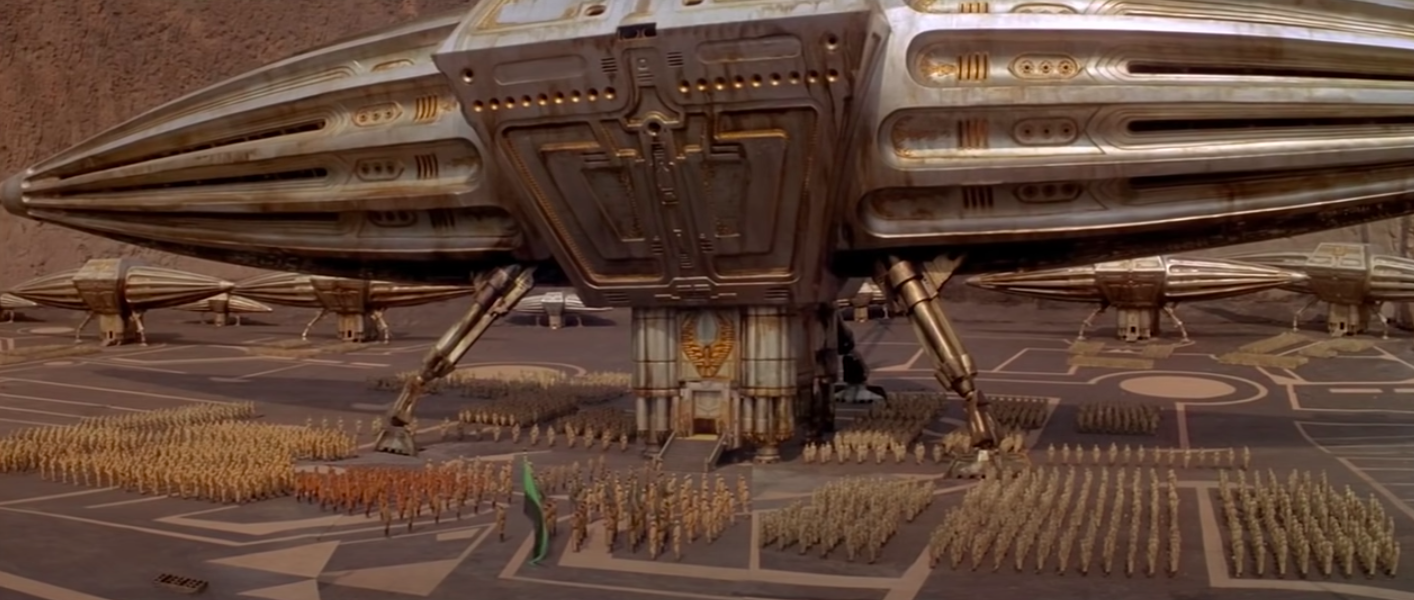 Unloading.
Unloading.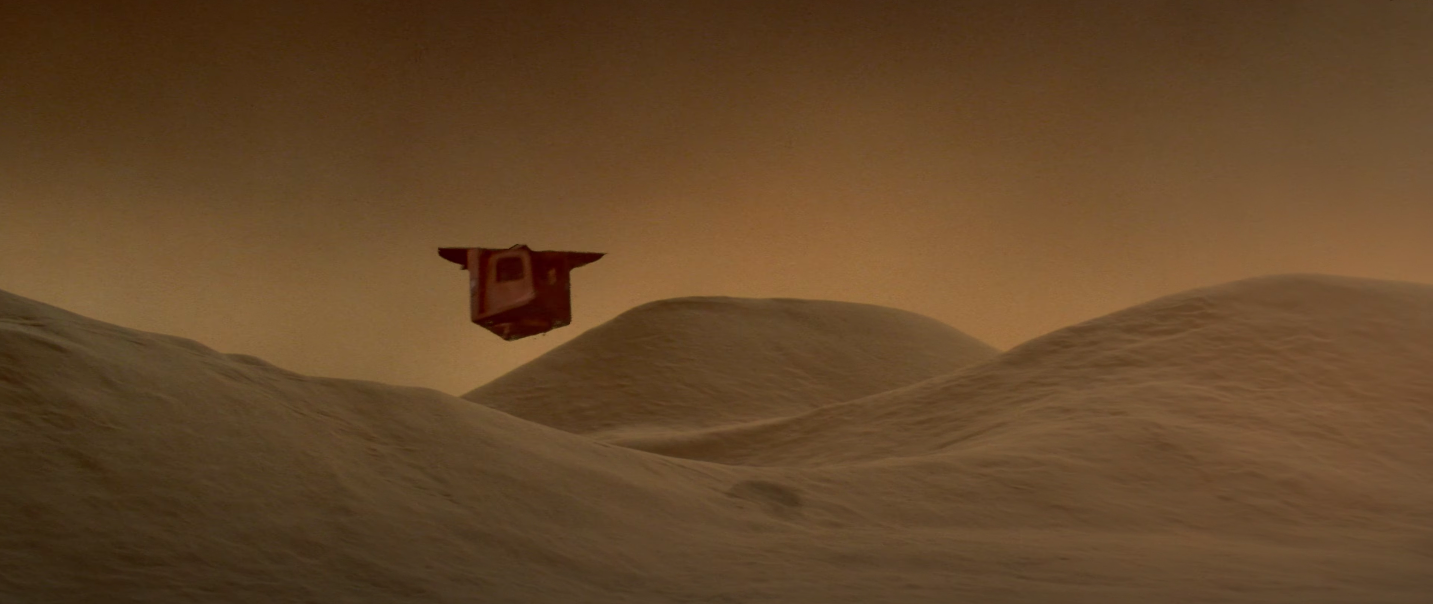 A shuttle flies across the surface of Dune.
A shuttle flies across the surface of Dune.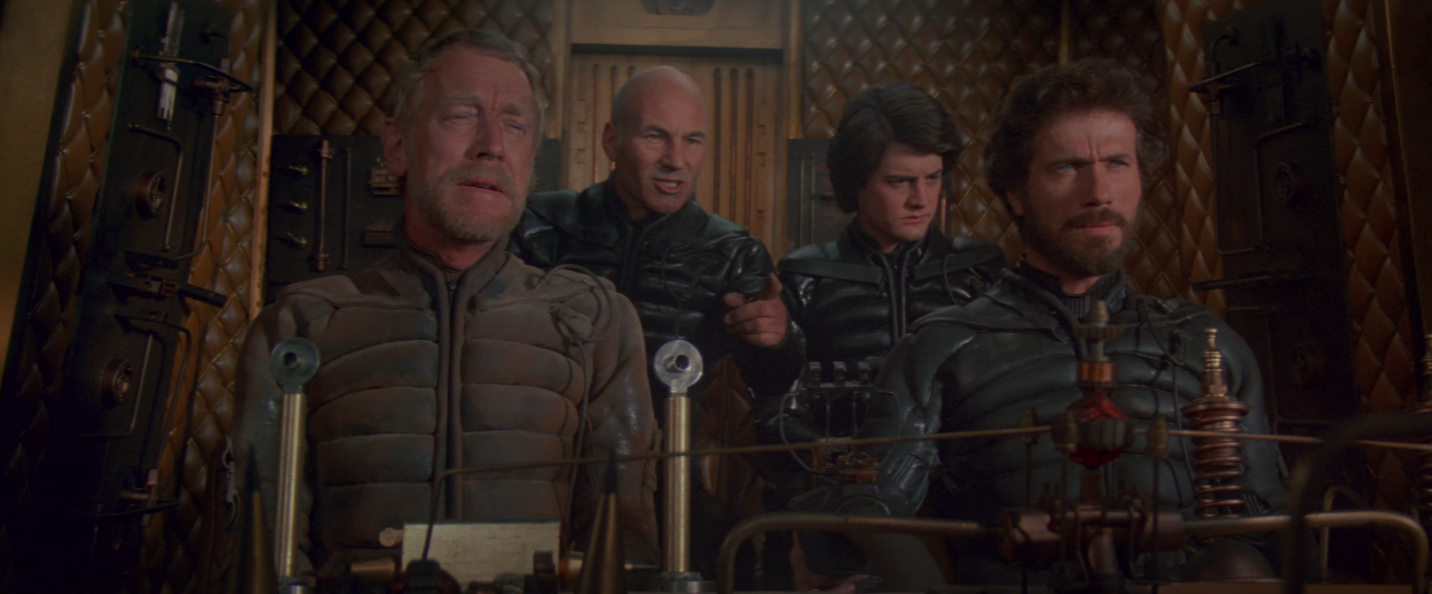 How'd I forget that Max von Sydow is in this? Anyway, he's flying the shuttle. The patriarch of the Atreides (Jürgen Prochnow) is the hale fellow on the right.
How'd I forget that Max von Sydow is in this? Anyway, he's flying the shuttle. The patriarch of the Atreides (Jürgen Prochnow) is the hale fellow on the right.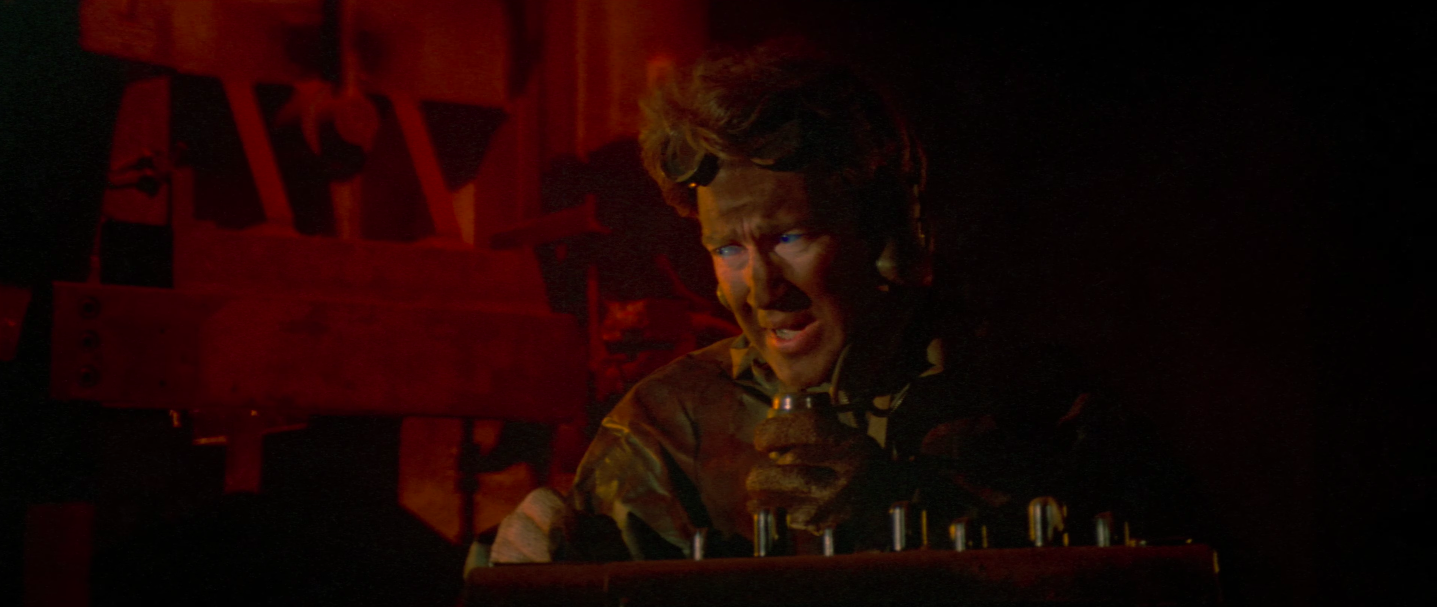 Why wouldn't David Lynch be a Spice miner on the planet Dune? He is, after all, the kwisatz haderach.
Why wouldn't David Lynch be a Spice miner on the planet Dune? He is, after all, the kwisatz haderach.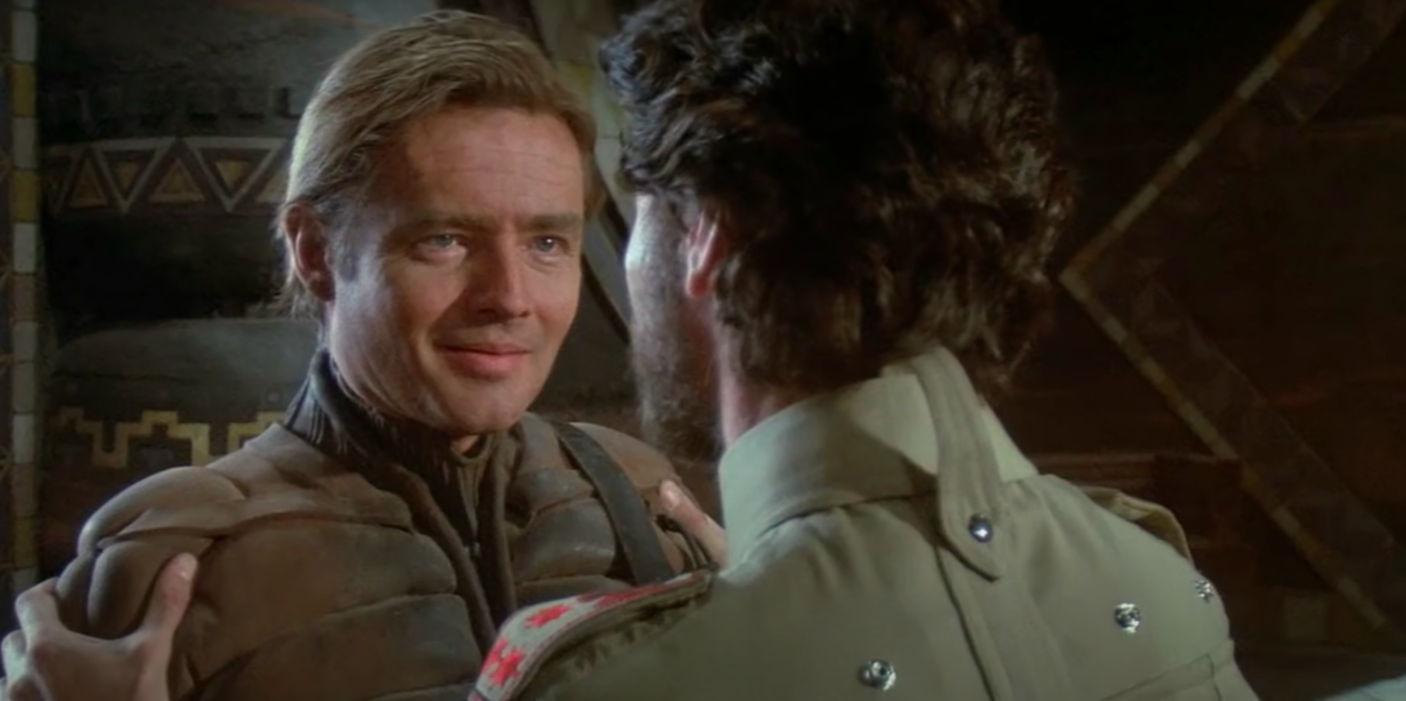 The hoopla around Duncan Idaho's (Richard Jordan) appearance, followed by him doing just about nothing, helps give Dune its dreamlike feel.
The hoopla around Duncan Idaho's (Richard Jordan) appearance, followed by him doing just about nothing, helps give Dune its dreamlike feel.
So which group am I in? Both. Am I about to describe Dune as "so bad it's good"? No, that's a loser take for cowards.
I once half-heard a radio interview with someone speculating that the then-current artistic moment was not "so bad it's good," and it wasn't "ironic" either—it was actually "awesome." (I didn't catch who he was, so if any of this sounds familiar, hit me up in the comments.) Art can speak to you while at the same time being absurd. The relatable can sometimes be reached only by going through the ridiculous. The two can be inseparable, like the gravitational pull between a gas giant and its moon—or Riggs and Murtaugh.
The example the radio interviewee gave was of Evel Knievel, the '70s daredevil who wore a cape and jumped dirt bikes over rows of buses. Absurd? Heavens, yes. A feat of motorcycling and physicality? Absolutely. But beyond that, we can relate to Knievel's need to achieve transcendence at such a, shall we say, niche skill. We might also marvel at our own ability to be impressed by something which should be objectively useless but is instead actually awesome.
A more contemporary example might be Tenet. It's a relentless international thriller about fate and climate change and the need for good people to hold evil at bay. But it's also a "dudes rock!" bromance between Two Cool Guys in Suits spouting sci-fi mumbo-jumbo. It can't be one without the other.
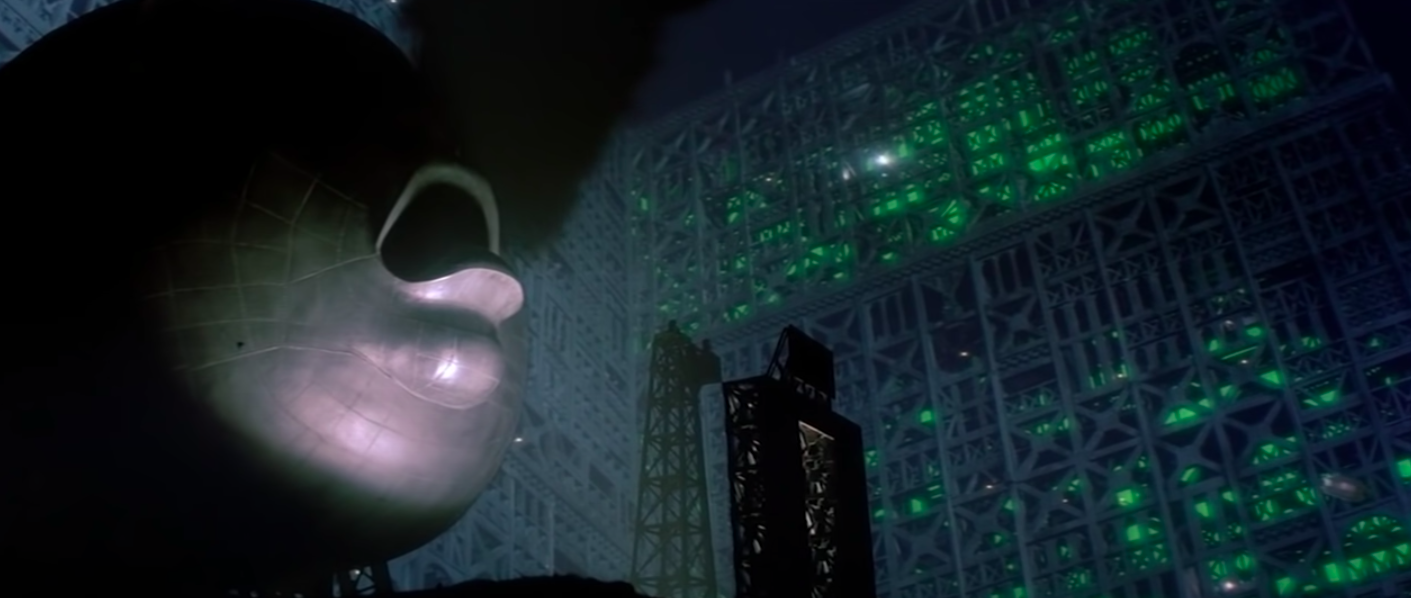 From their first appearance, the Harkonnen are all about domination and humiliation. Nature is being dominated on the Harkonnen home world.
From their first appearance, the Harkonnen are all about domination and humiliation. Nature is being dominated on the Harkonnen home world.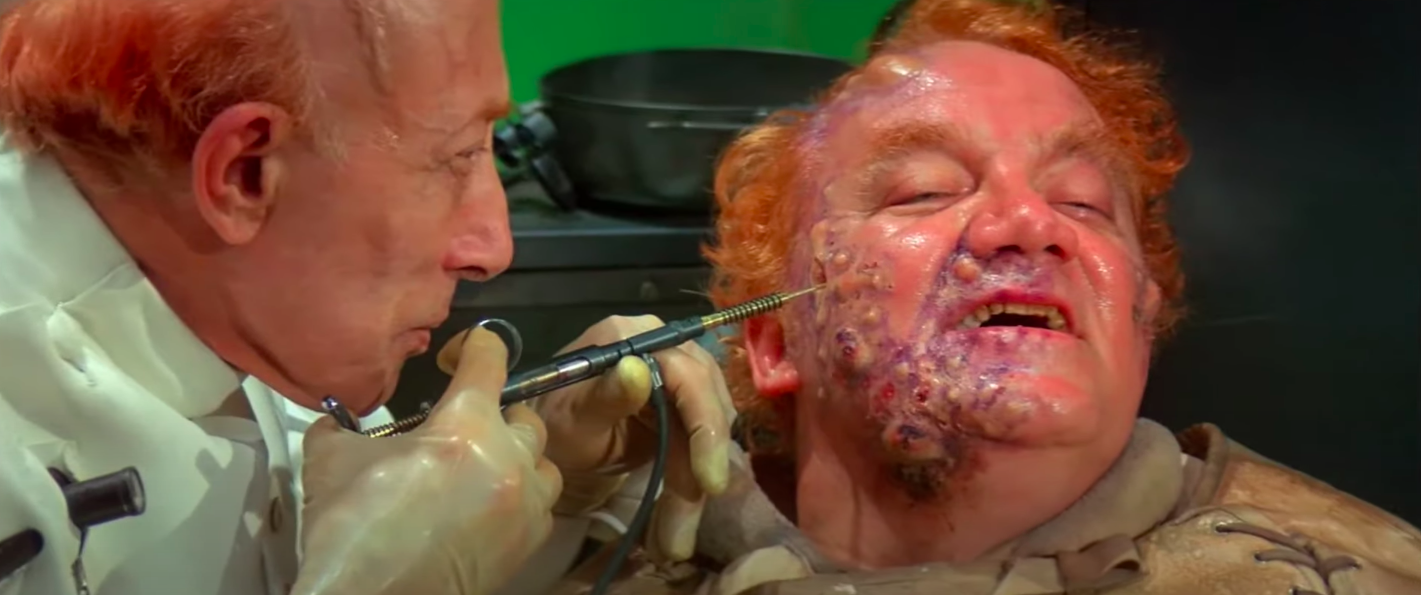 Baron Harkonnen (Kenneth McMillan) has problems. I took so many screenshots of him because I was trying to get one in midspittle. He's a spittle-heavy guy.
Baron Harkonnen (Kenneth McMillan) has problems. I took so many screenshots of him because I was trying to get one in midspittle. He's a spittle-heavy guy.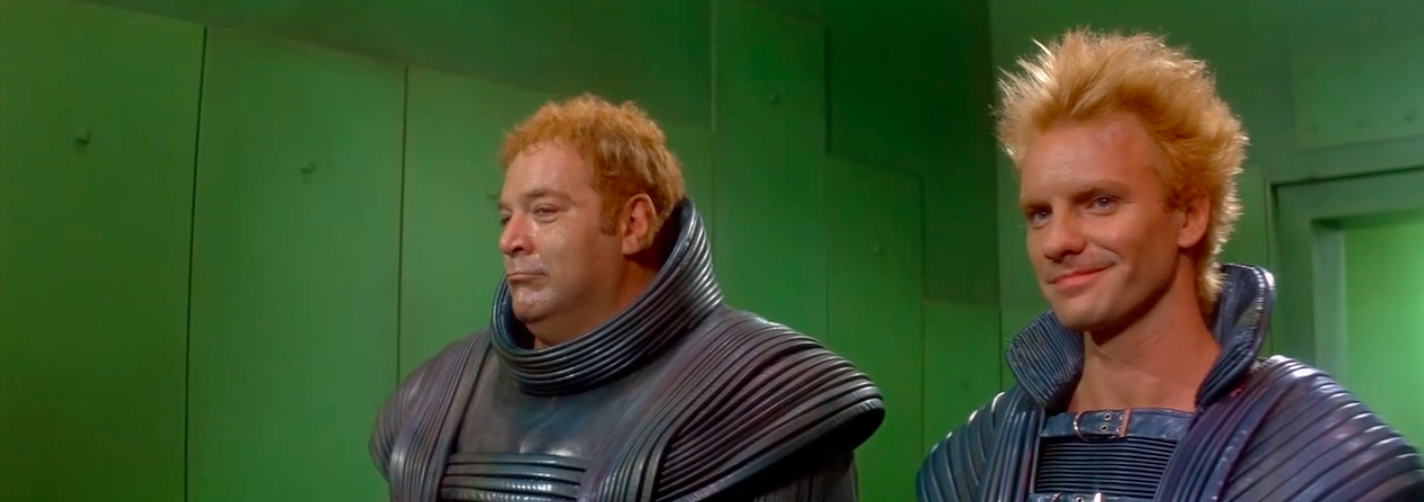 His nephews are The Beast (Paul Smith) and Feyd (Sting). Their uniforms combine Flash Gordon schlock with fetish gear and are obviously too heavy for the sweaty environs of the Harkonnen home world.
His nephews are The Beast (Paul Smith) and Feyd (Sting). Their uniforms combine Flash Gordon schlock with fetish gear and are obviously too heavy for the sweaty environs of the Harkonnen home world.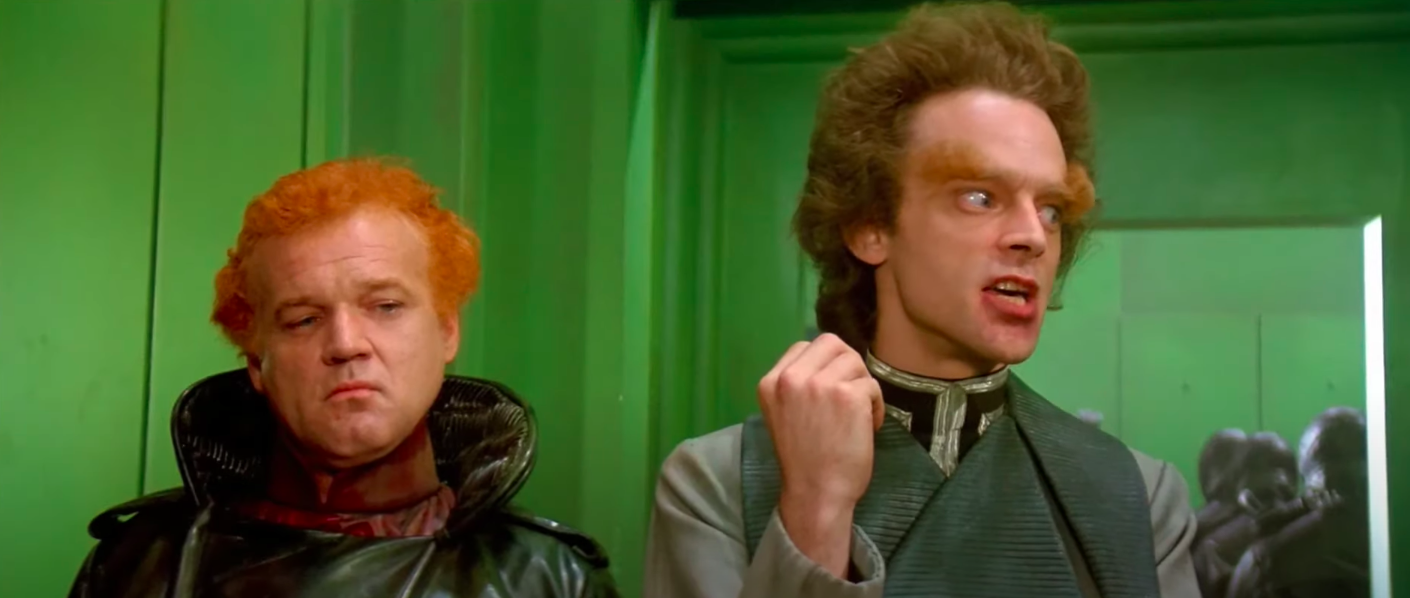 Some Harkonnen lackeys. On the left is Eraserhead himself, Jack Nance. He also finds Laura Palmer's body and has the first line of dialogue in Twin Peaks. Next to him is Brad Dourif, who has been in sequels to Alien, The Exorcist, Lord of the Rings, and Bad Lieutenant, and he is the voice of Chucky. Truly, a weirdo's weirdo.
Some Harkonnen lackeys. On the left is Eraserhead himself, Jack Nance. He also finds Laura Palmer's body and has the first line of dialogue in Twin Peaks. Next to him is Brad Dourif, who has been in sequels to Alien, The Exorcist, Lord of the Rings, and Bad Lieutenant, and he is the voice of Chucky. Truly, a weirdo's weirdo.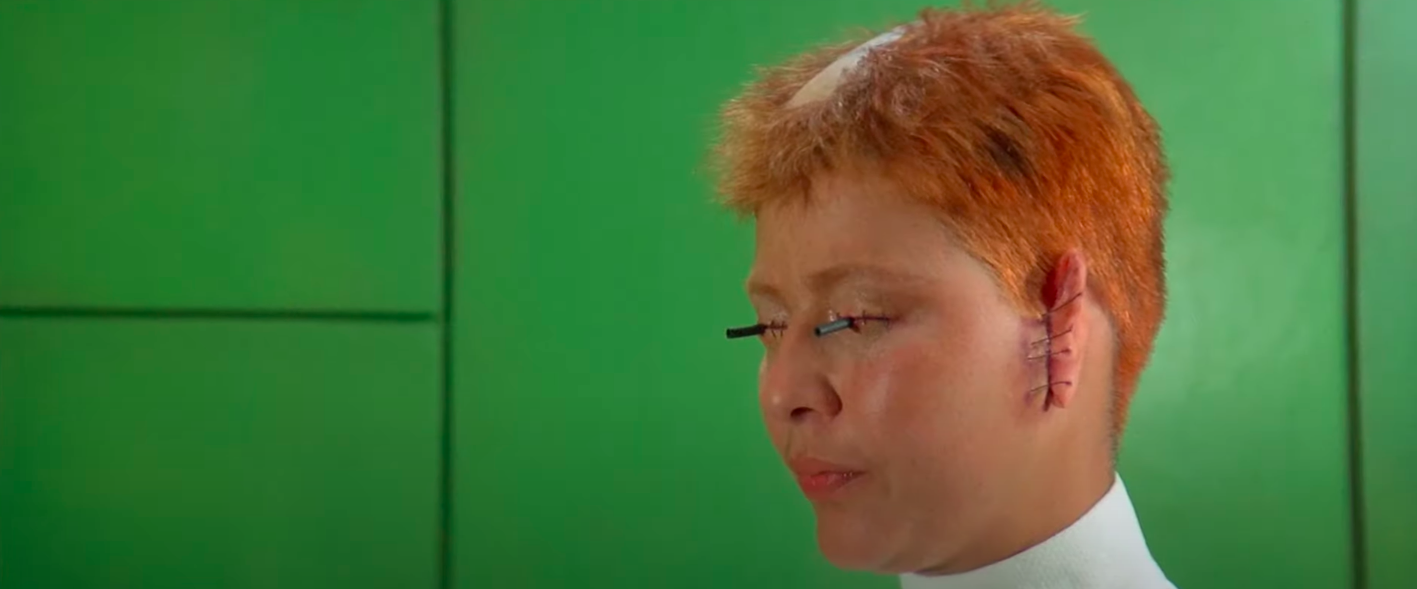 Here's a Harkonnen servant. Remember to join a union, kids!Universal Pictures
Here's a Harkonnen servant. Remember to join a union, kids!Universal Pictures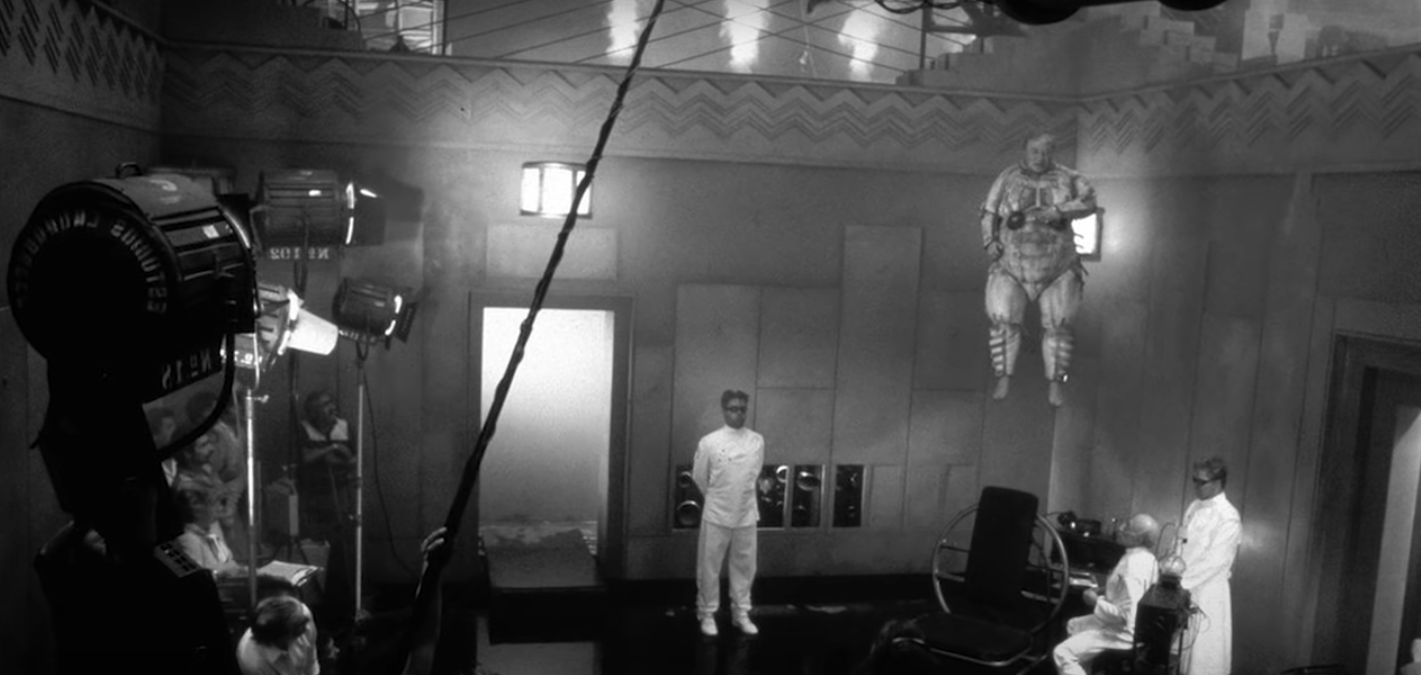 A behind-the-scenes shot of the Baron's... throne room? Having your lackeys watch you get your zits popped is a flex, I guess. Also, the Baron can fly.
A behind-the-scenes shot of the Baron's... throne room? Having your lackeys watch you get your zits popped is a flex, I guess. Also, the Baron can fly.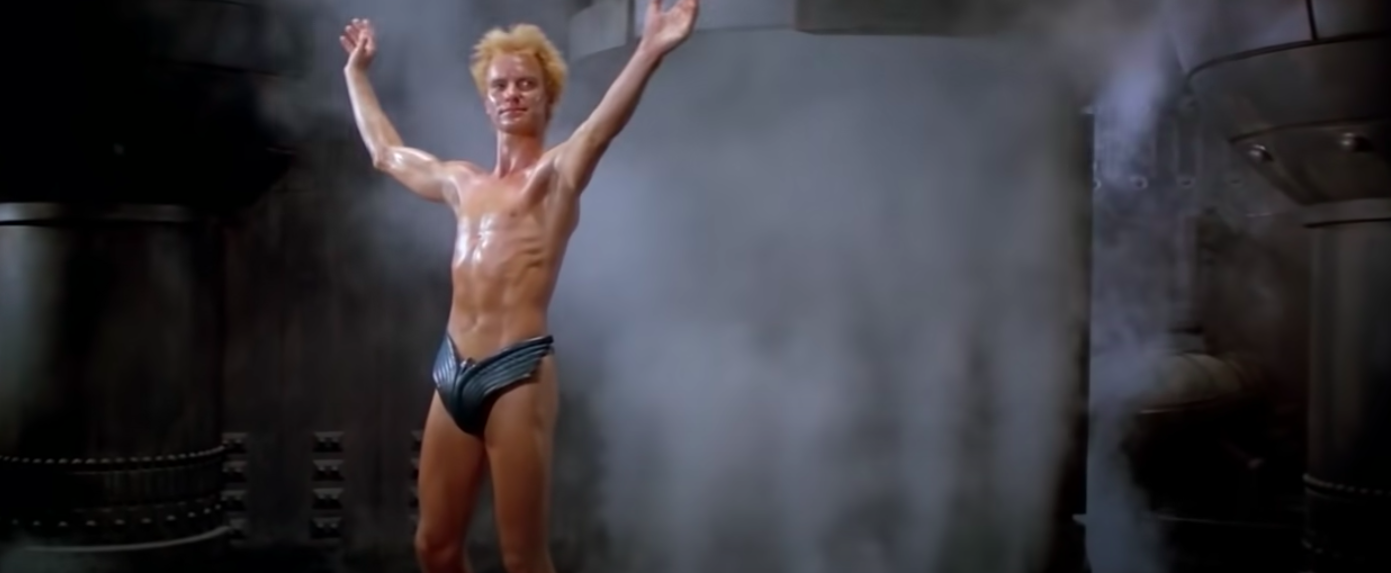 Here's the image you've been clamoring for, you animals.
Here's the image you've been clamoring for, you animals.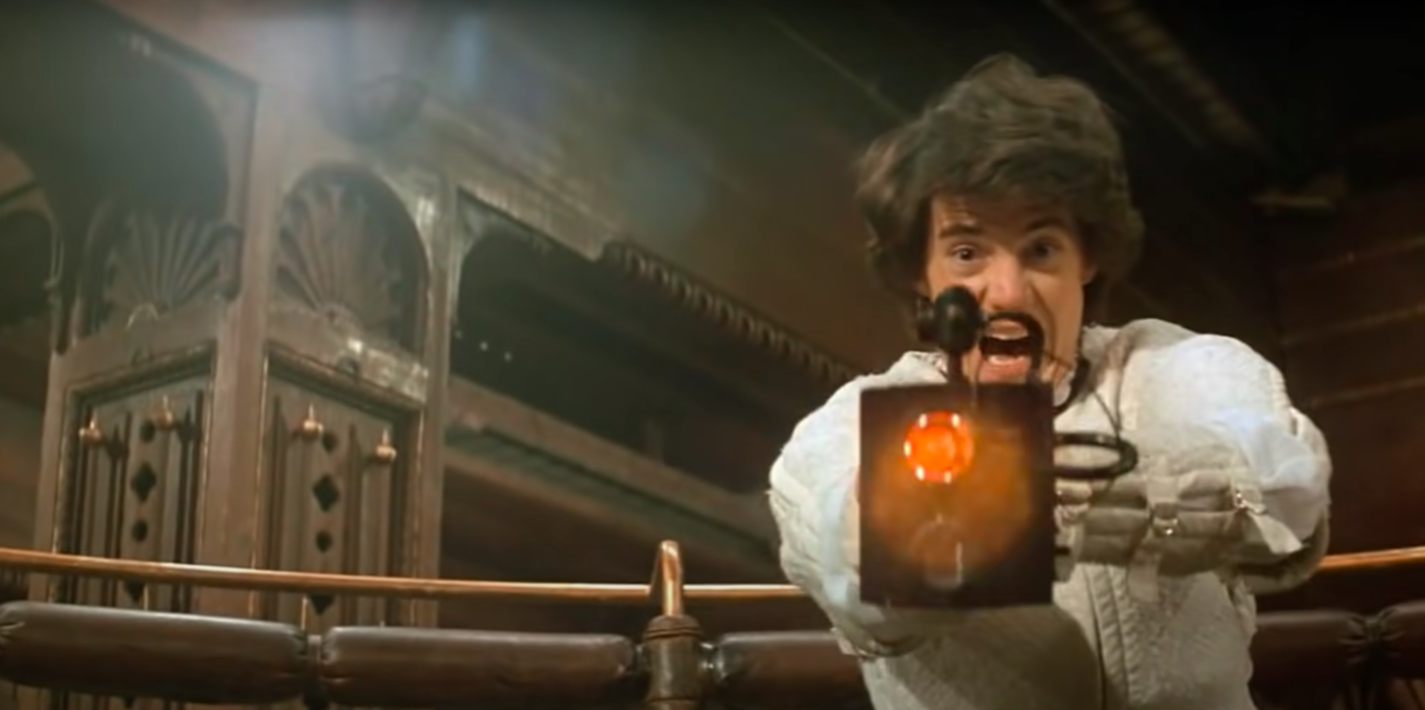 Paul trains to fight with this voice gun, but Dune is mostly a quiet movie. I'm showing off this screenshot at my next performance review. I got mad screenshot skills.
Paul trains to fight with this voice gun, but Dune is mostly a quiet movie. I'm showing off this screenshot at my next performance review. I got mad screenshot skills.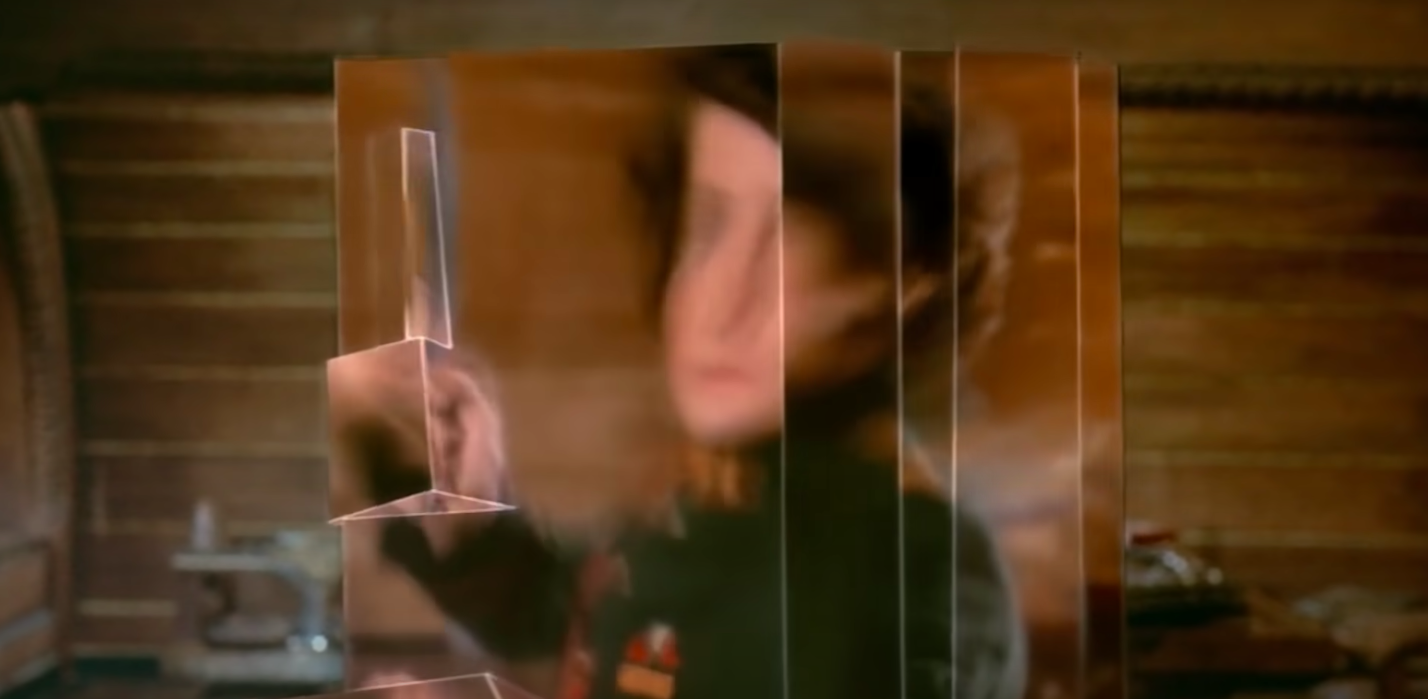 No, your monitor isn't messed up, and you're not having a stroke—that's Paul wearing an energy shield!
No, your monitor isn't messed up, and you're not having a stroke—that's Paul wearing an energy shield!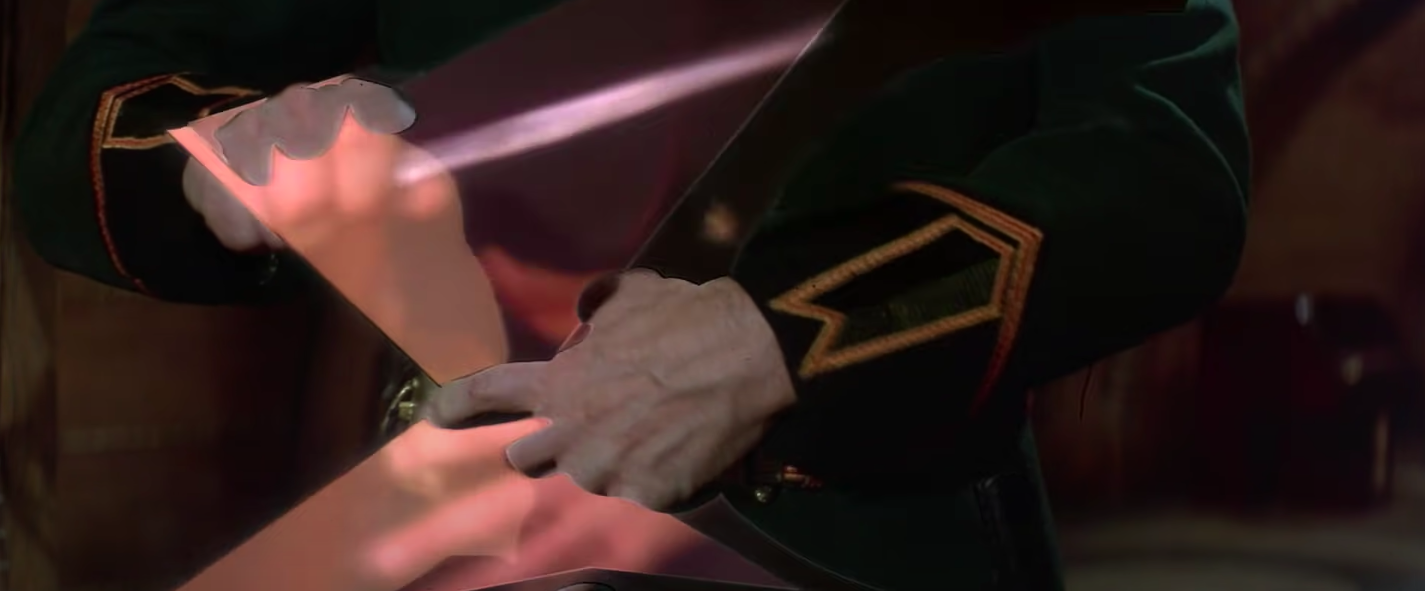 The shield is activated by a button on your belt, which was the style at the time.
The shield is activated by a button on your belt, which was the style at the time.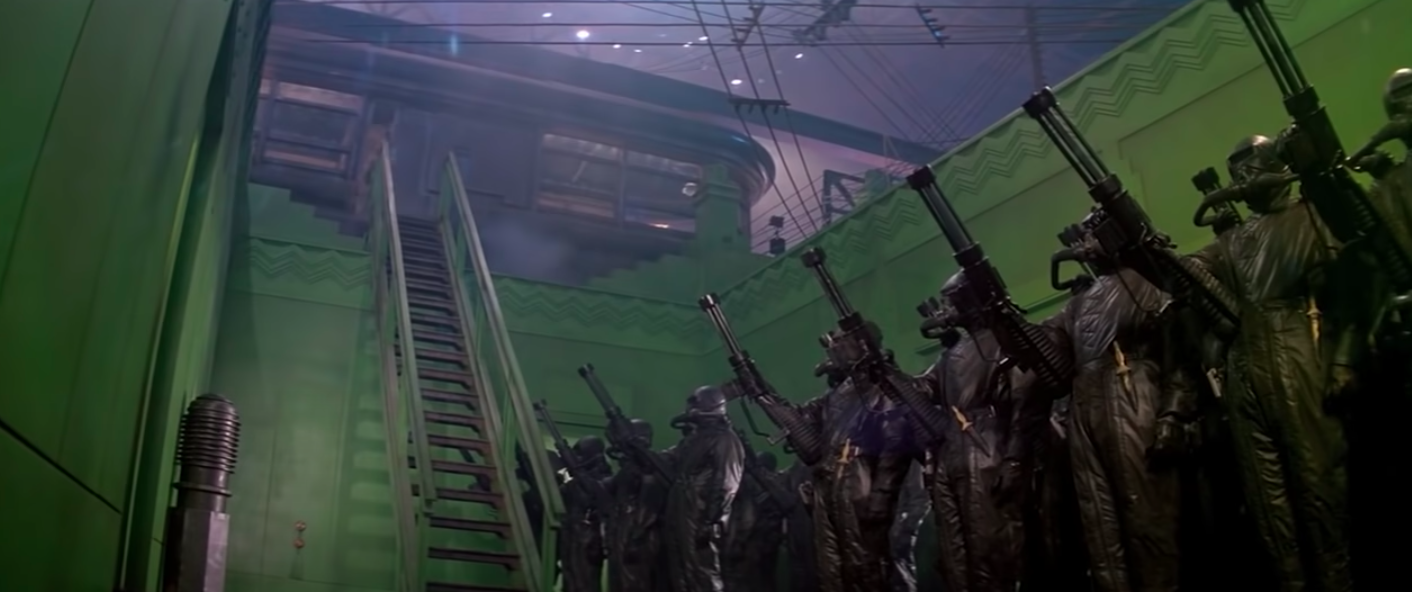 Harkonnen soldiers prepare for battle.
Harkonnen soldiers prepare for battle.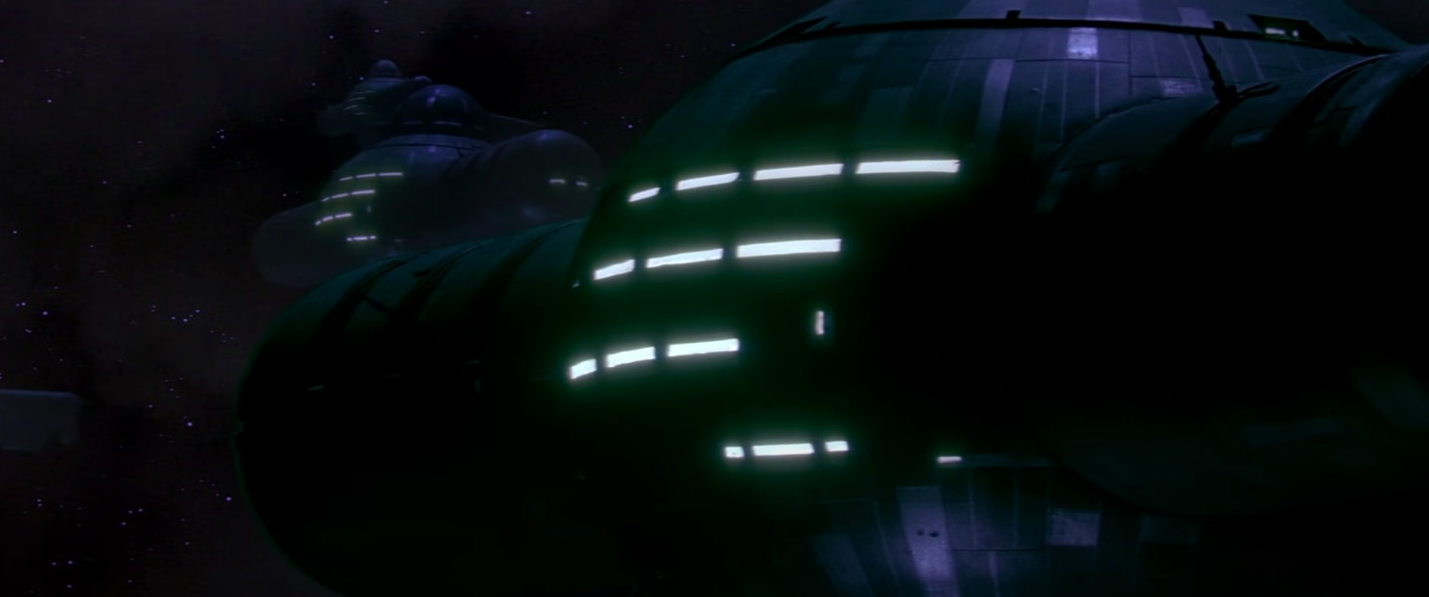 The Harkonnen en route to Dune.
The Harkonnen en route to Dune.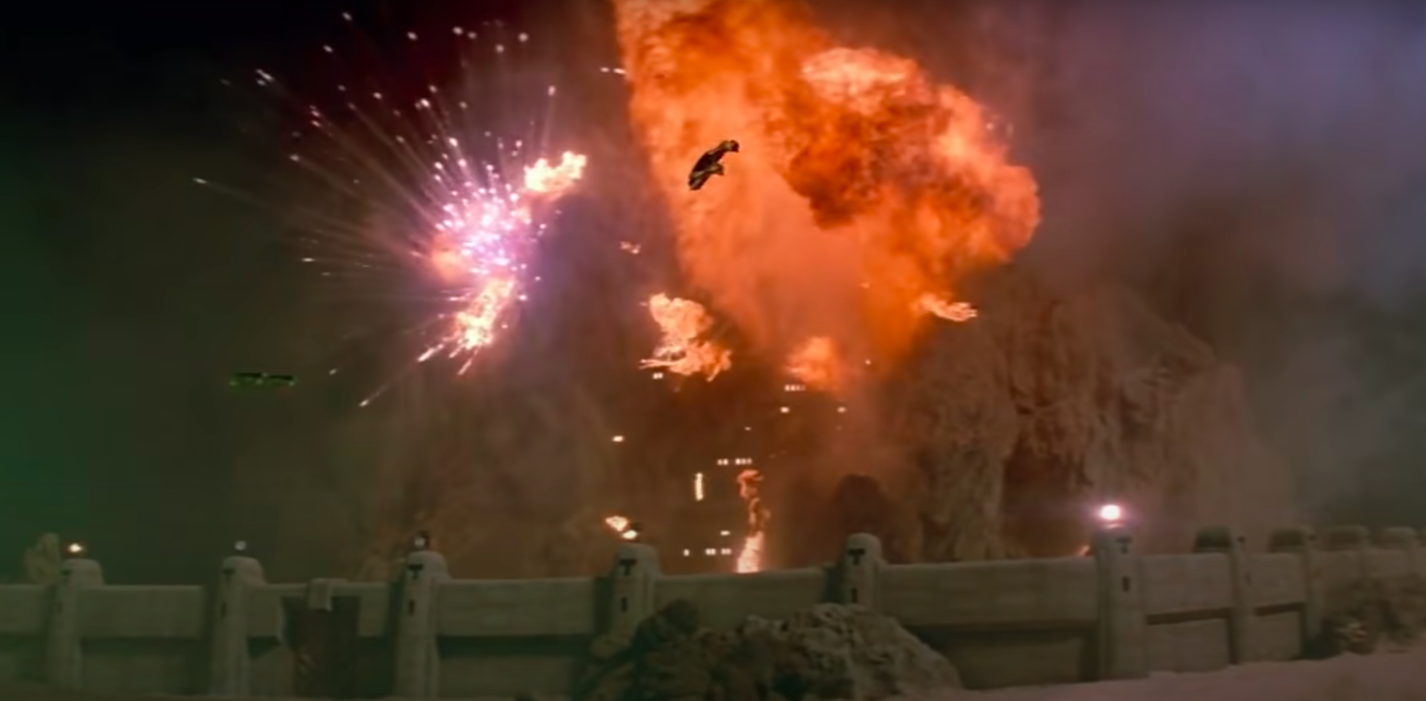 A pitched battle in the sky. Pew-pew!
A pitched battle in the sky. Pew-pew!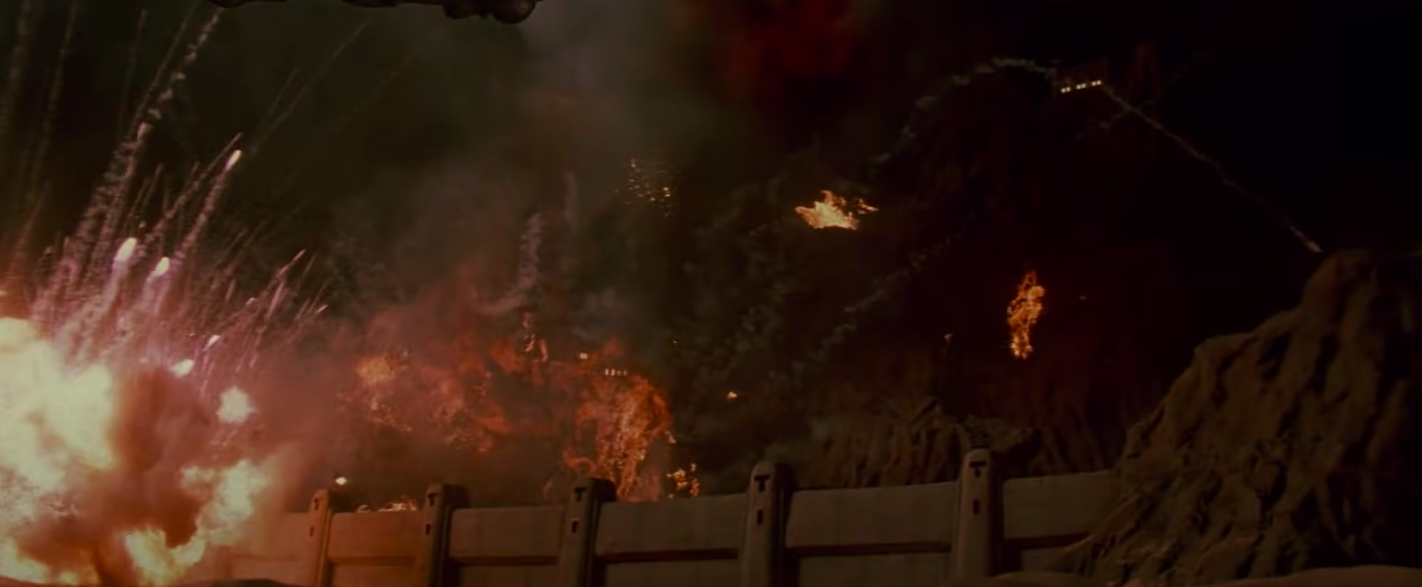 Ka-blammo!
Ka-blammo!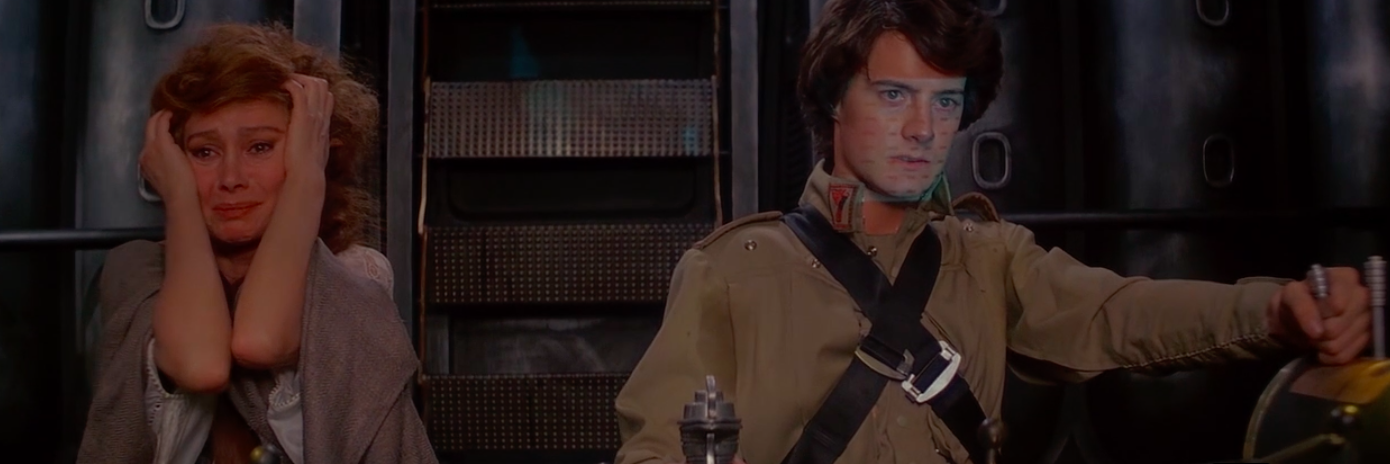 My mom does the same thing when I drive.
My mom does the same thing when I drive.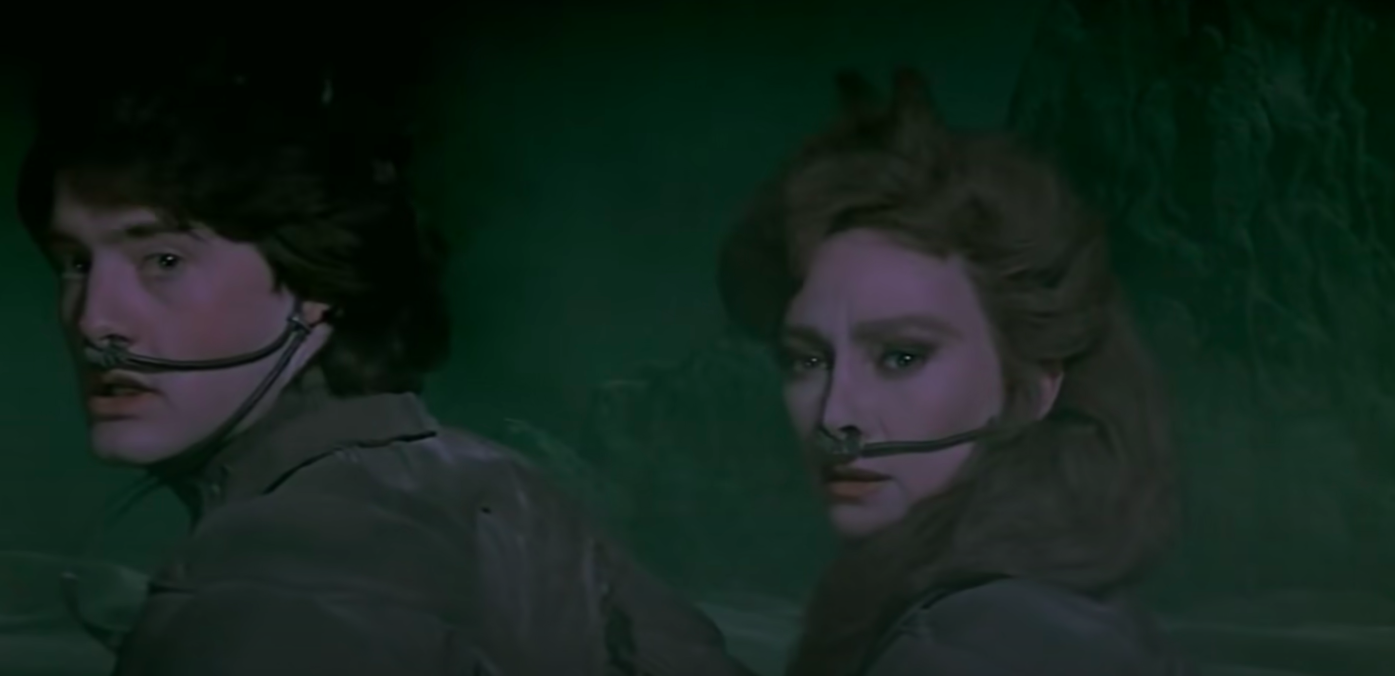 Paul and his mom (Francesca Annis) flee the Harkonnen assault.
Paul and his mom (Francesca Annis) flee the Harkonnen assault.
Travel without moving
I love Dune because it feels just as alien as something set 80 centuries in the future should. (To put that span of time in context, remember that 8,000 years in the past would still be 3,500 years before the Great Pyramids were built.) To create this feeling, Lynch blurs the novel's plot and characters into a Spaceballs "ludicrous speed" lightshow.
Dune is the dream you have after reading a book about the distant future while listening to a 90-minute prog-rock album. Also, you may have done a pile of blow before falling asleep, because Sting is strutting around in Batman's speedo.
Characters drift in and out, and their identities and relationships are unclear. A bear-sized scrotal mutant can move spaceships with drug-induced mind-magic. Soldiers bring drums to a knife fight. Plot threads are left untied. Brad Dourif has breathtaking eyebrows. Cast members deliver their inner thoughts via whispered, close-to-the-mic voiceovers worthy of an ASMR YouTube channel. The pacing is leisurely, almost hypnotic. You're here for the wild sights, the rococo spaceships, the high-collared uniforms, and conversations so formal they border on liturgical. Just sit back and let them wash over you.
In other words, this was not exactly how Universal Studios intended to spend $40 million in 1980s money.
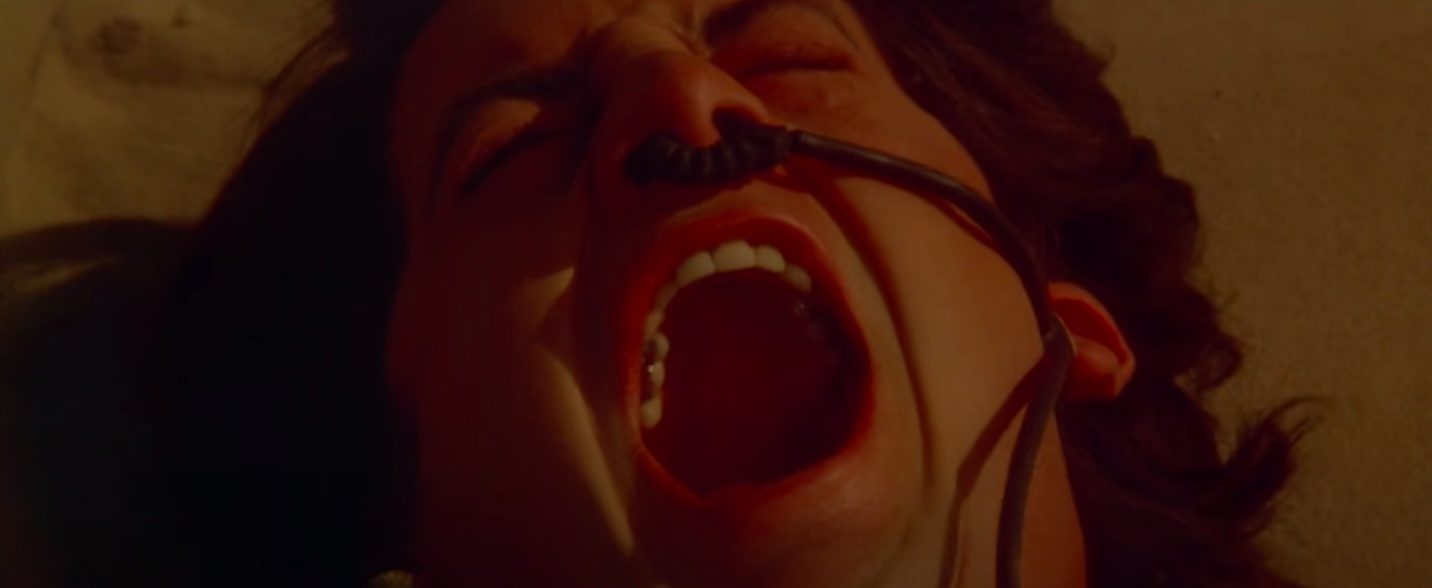 Time for Paul to have some visions in the desert.
Time for Paul to have some visions in the desert.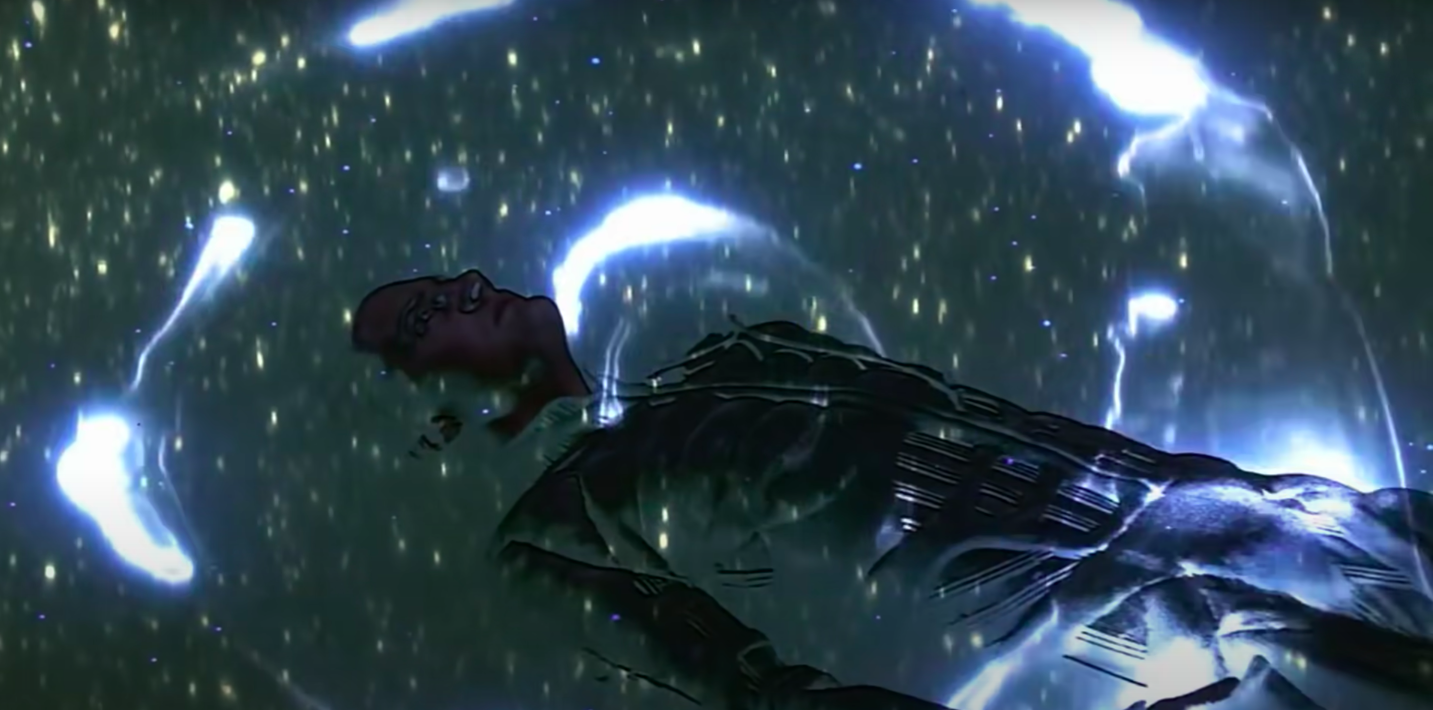 There we go. Give us that sweet, sweet lunacy, David!
There we go. Give us that sweet, sweet lunacy, David!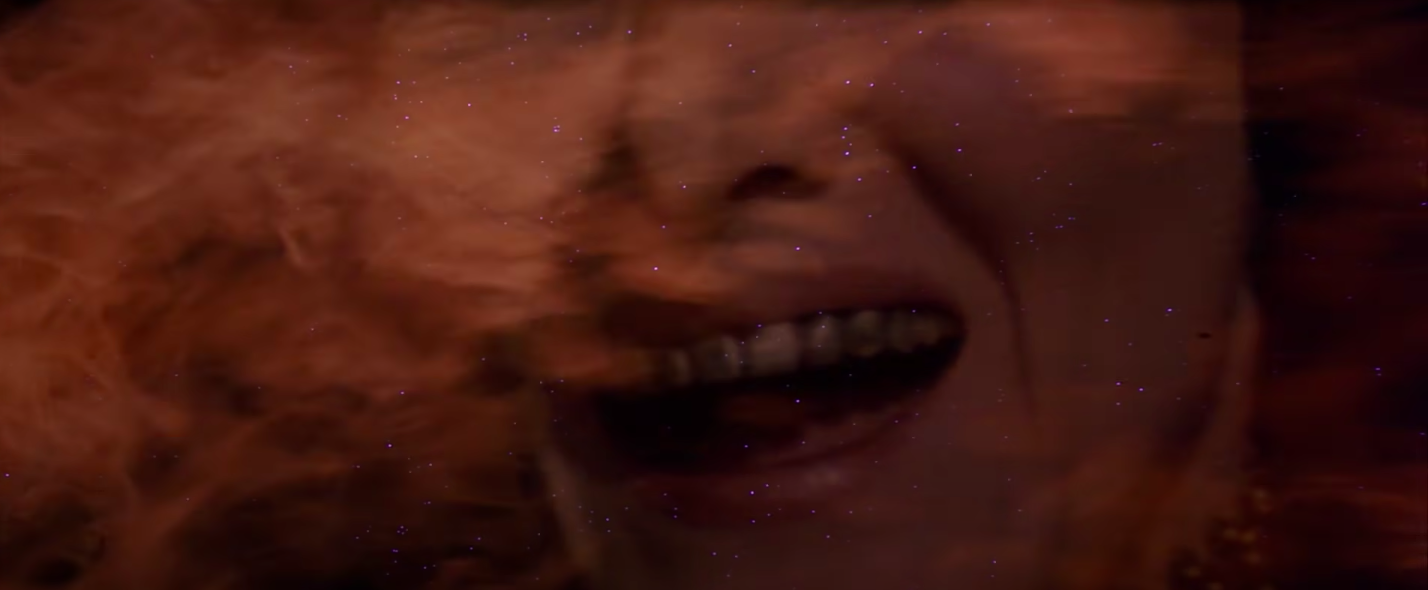 Yes! Put it in my veins!
Yes! Put it in my veins! A bag of The Spice. Time to rise and grind.
A bag of The Spice. Time to rise and grind.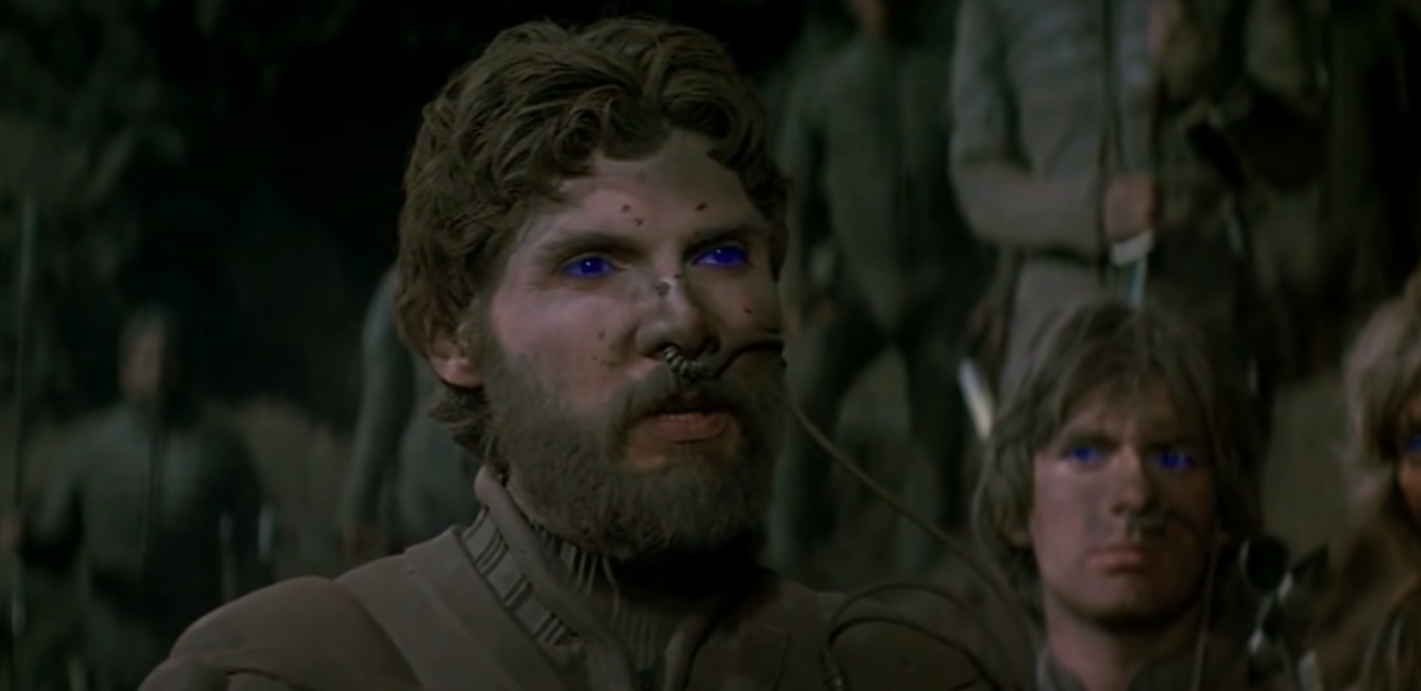 Paul teams up with Dune's indigenous freedom fighters. You got a bunch of crap on your face, Big Ed.
Paul teams up with Dune's indigenous freedom fighters. You got a bunch of crap on your face, Big Ed.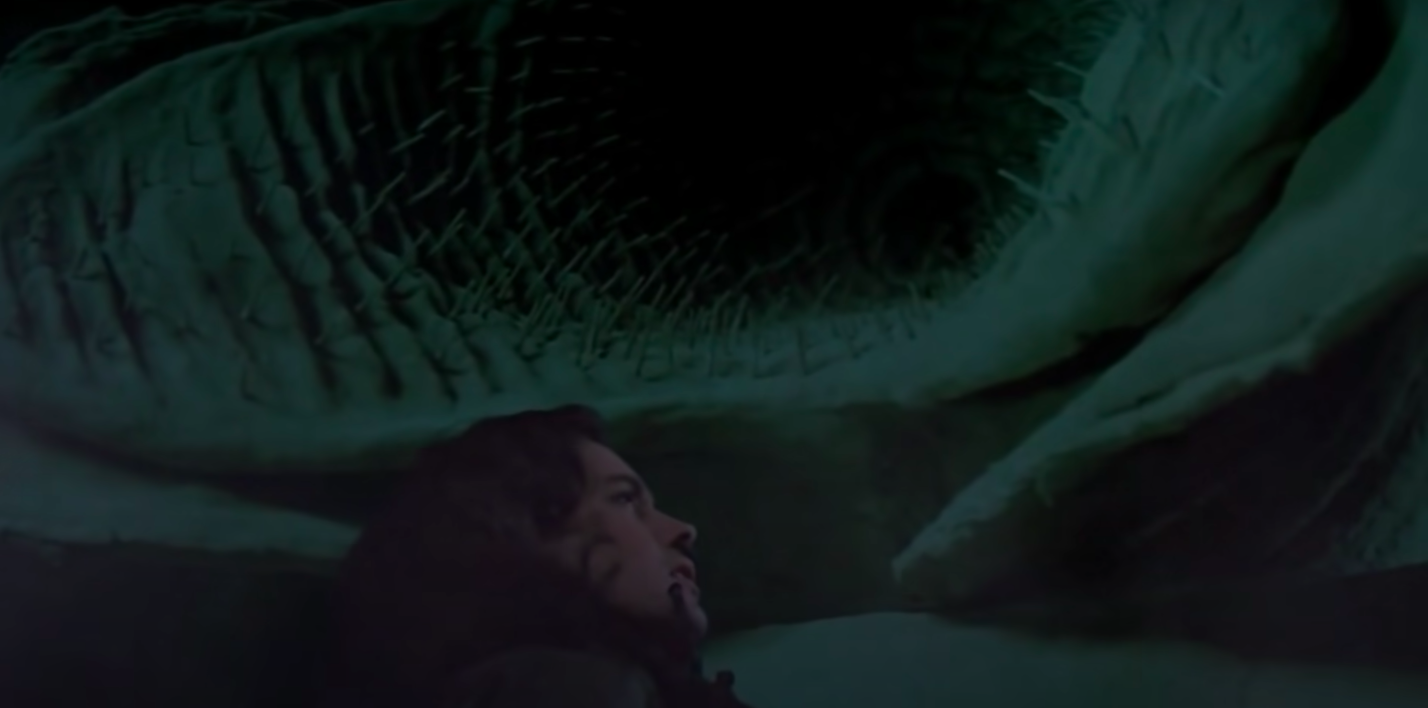 Sandworm at night. "Do you hear something?"
Sandworm at night. "Do you hear something?"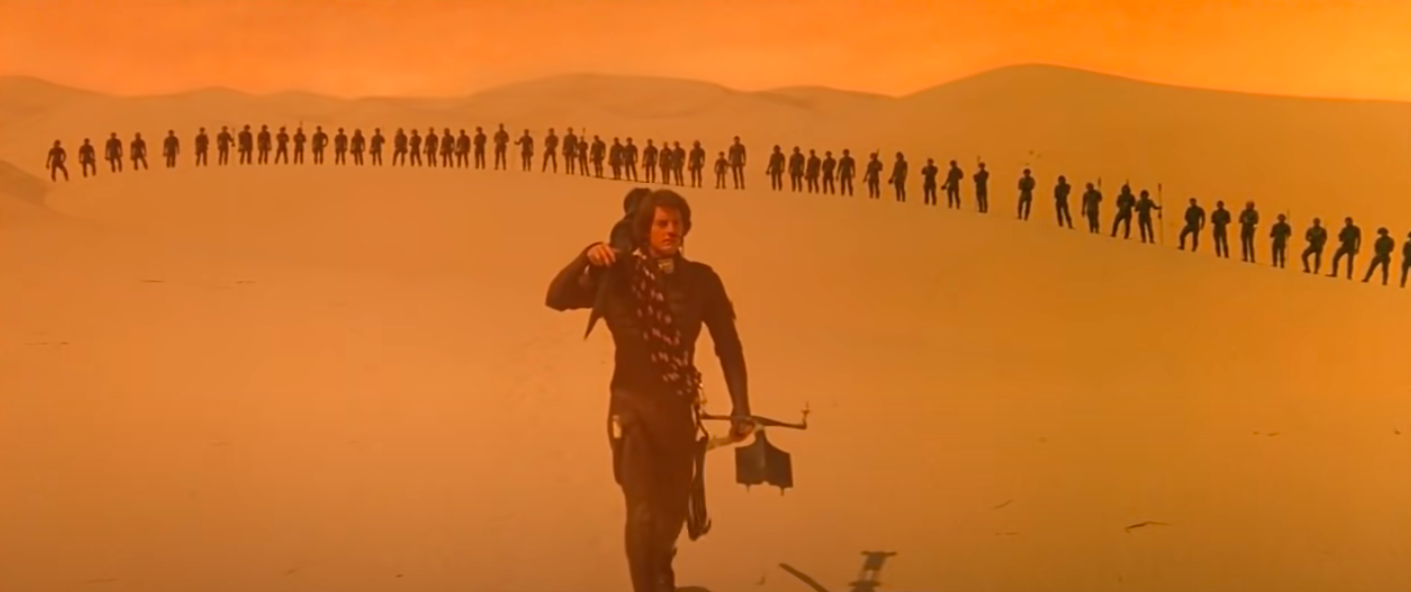 Paul goes to summon a sandworm.
Paul goes to summon a sandworm.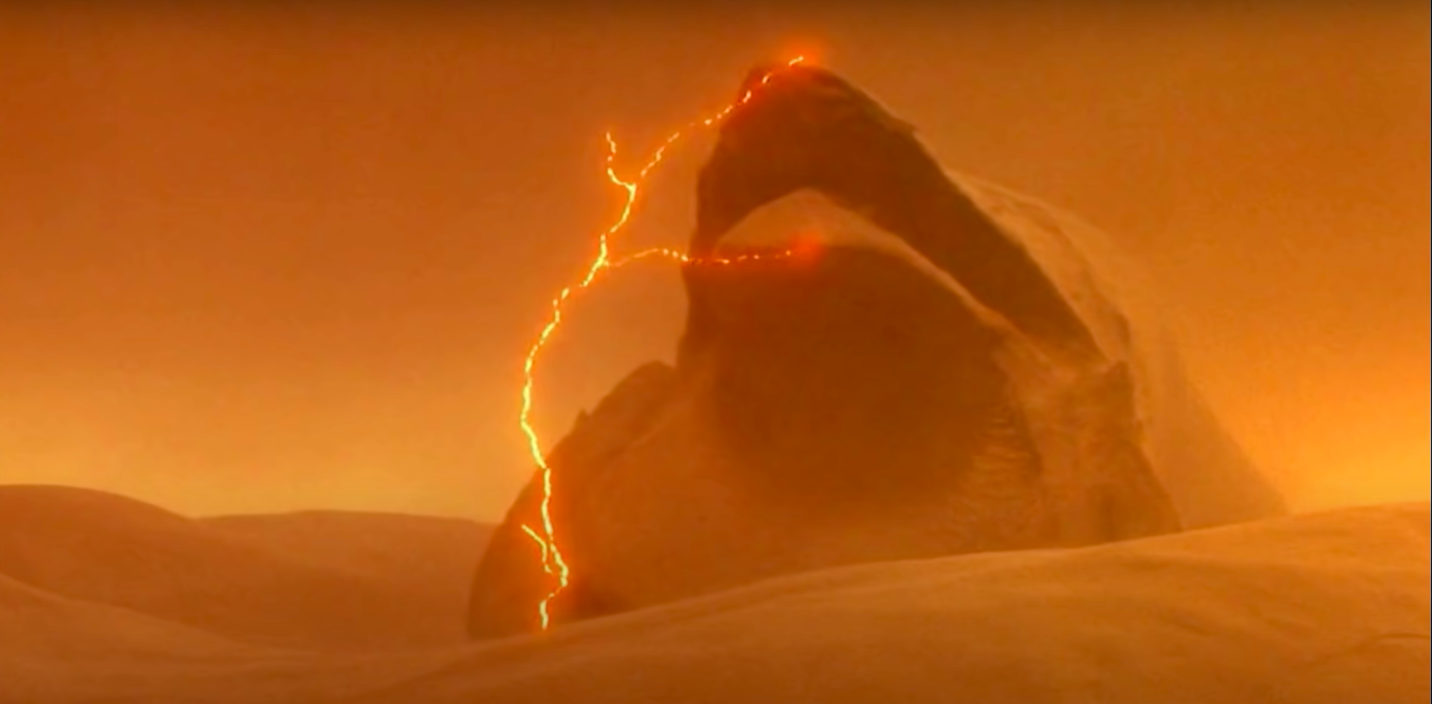 There's one!Universal Pictures
There's one!Universal Pictures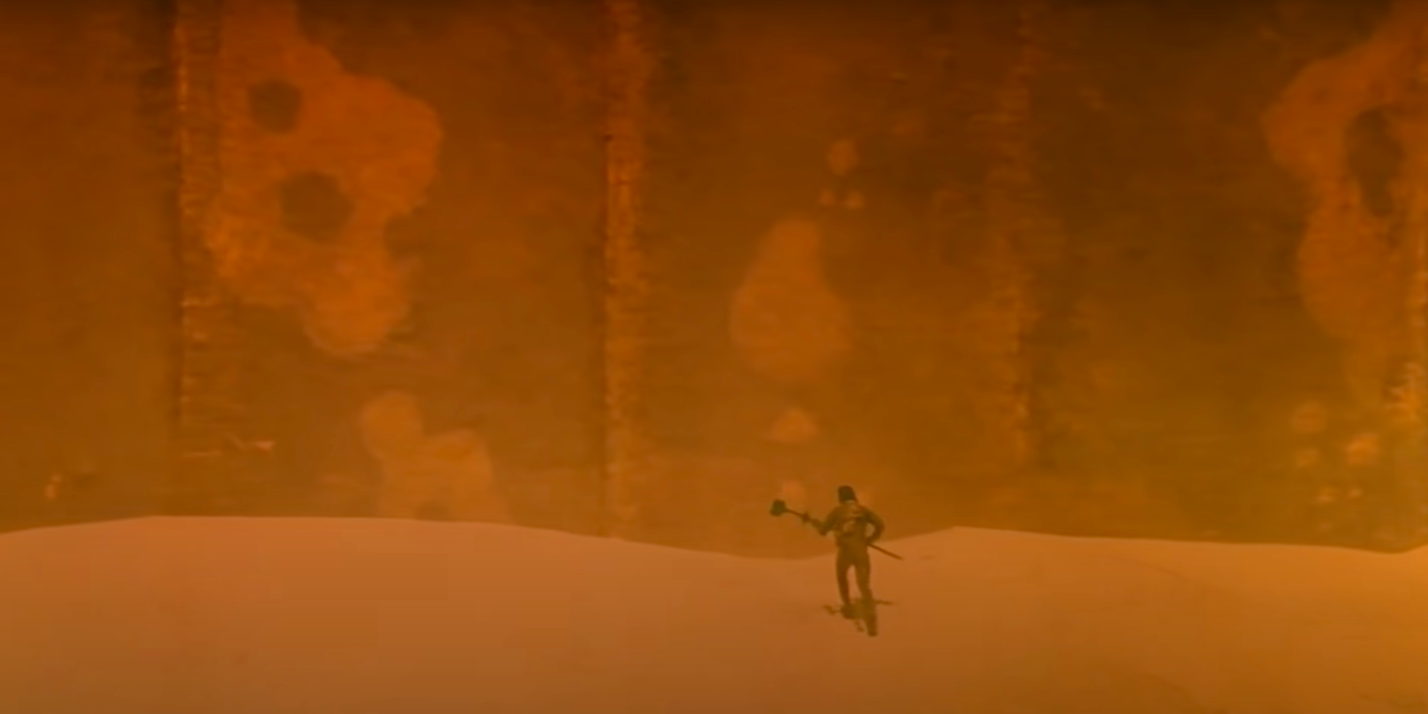 "Where do you think you're going, mister!"
"Where do you think you're going, mister!"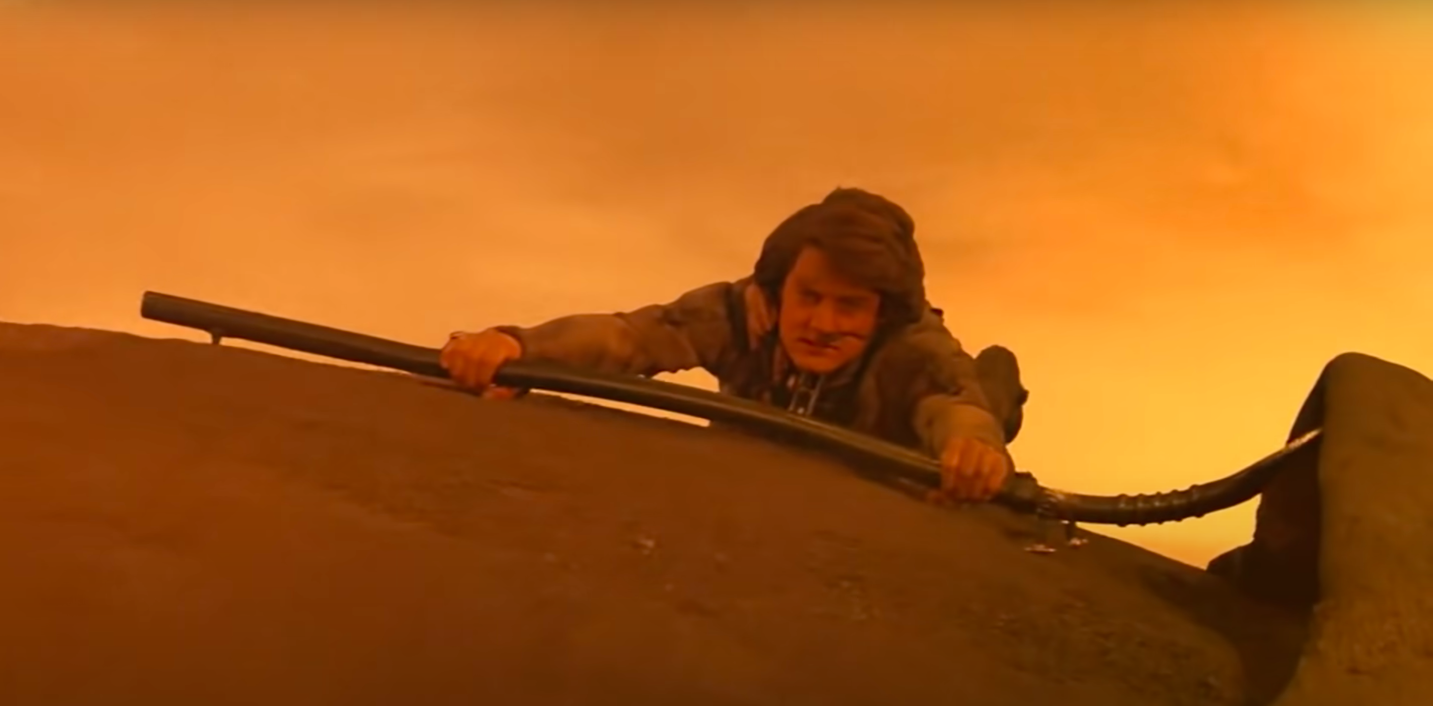 Dune is one of the few times I can think of that Lynch dwells on physically large objects, like spaceships, sandworms, and refinery-temples. Usually he maxes out with elephants, classic cars, or giant tea kettles possessed by the spirit of David Bowie. Lynch handles the battles and crowd scenes, but he's always been more interested in the intimate, the gesture, the expression, the body (sometimes beautiful, often grotesque).
Dune is one of the few times I can think of that Lynch dwells on physically large objects, like spaceships, sandworms, and refinery-temples. Usually he maxes out with elephants, classic cars, or giant tea kettles possessed by the spirit of David Bowie. Lynch handles the battles and crowd scenes, but he's always been more interested in the intimate, the gesture, the expression, the body (sometimes beautiful, often grotesque).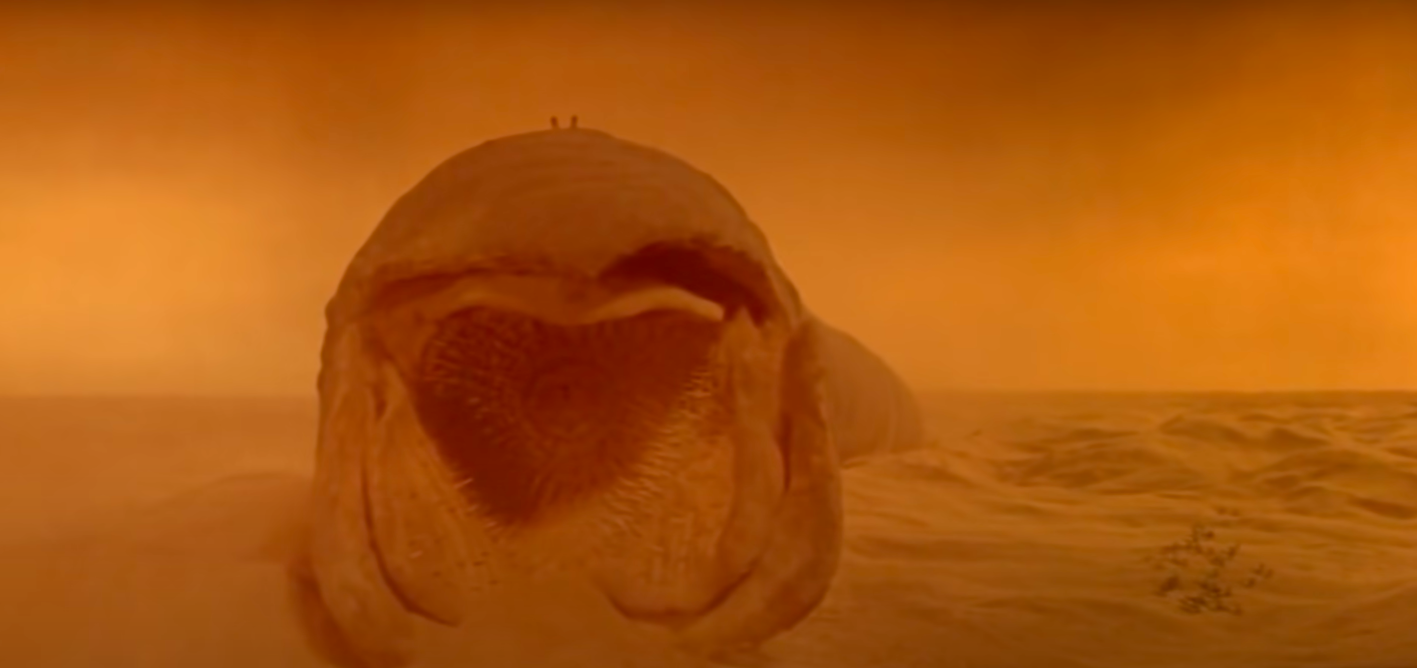 Riding a sandworm.
Riding a sandworm.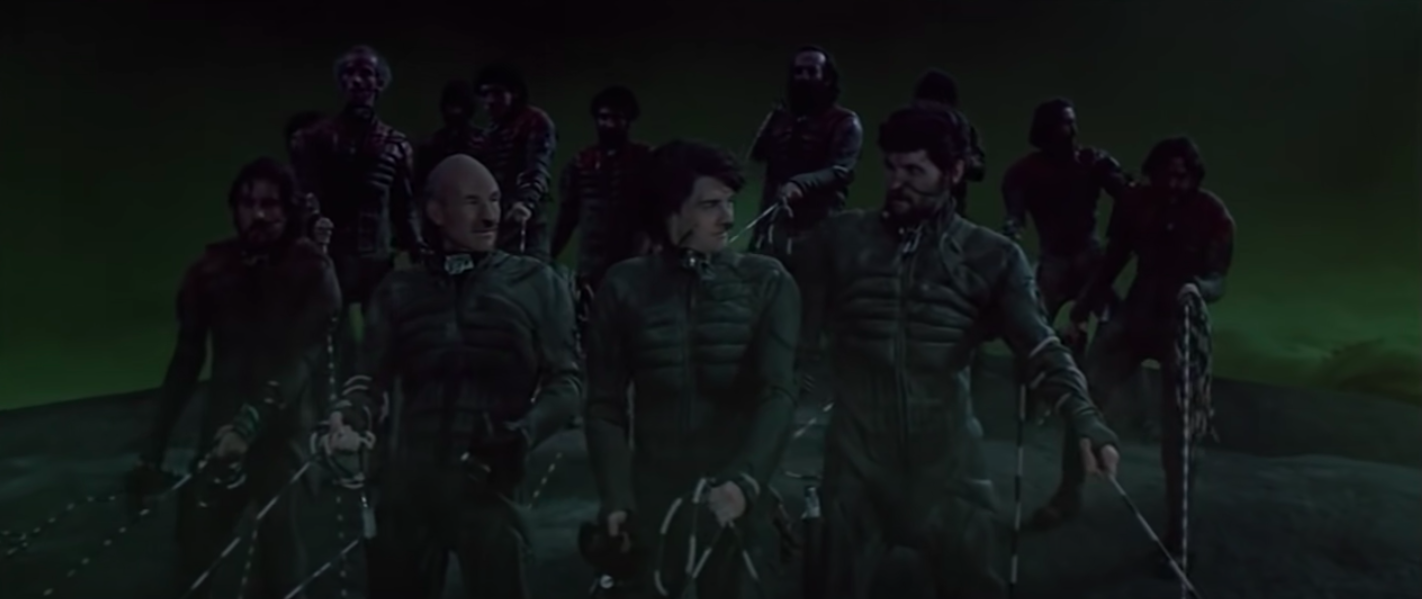 Paul and his crew ride a sandworm. I wish I could still find the GIF that combines this with an Applebee's.
Paul and his crew ride a sandworm. I wish I could still find the GIF that combines this with an Applebee's.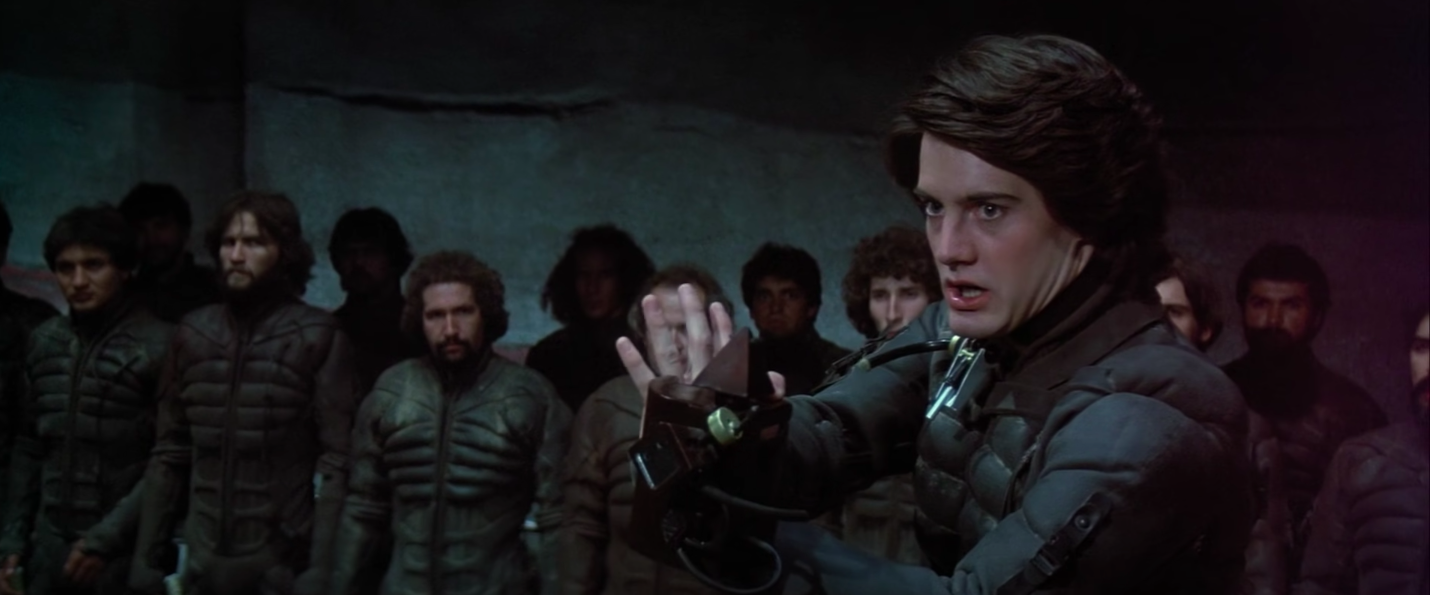 Paul teaches his new pals how to use voice-guns.
Paul teaches his new pals how to use voice-guns.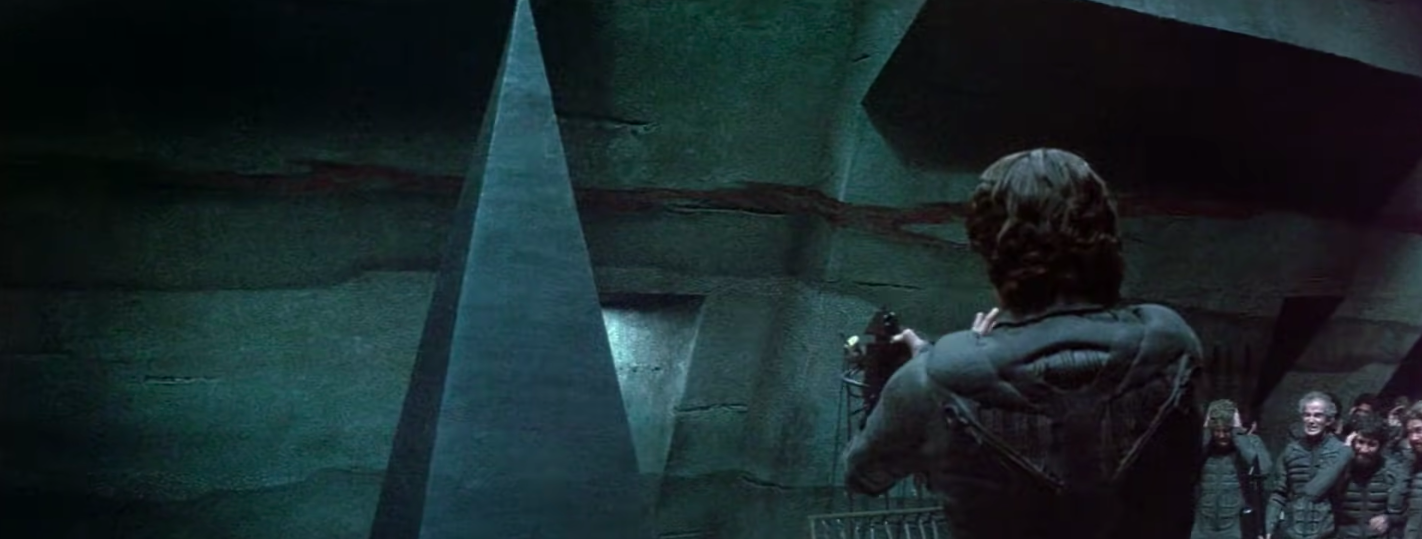 "Check this out!"
"Check this out!"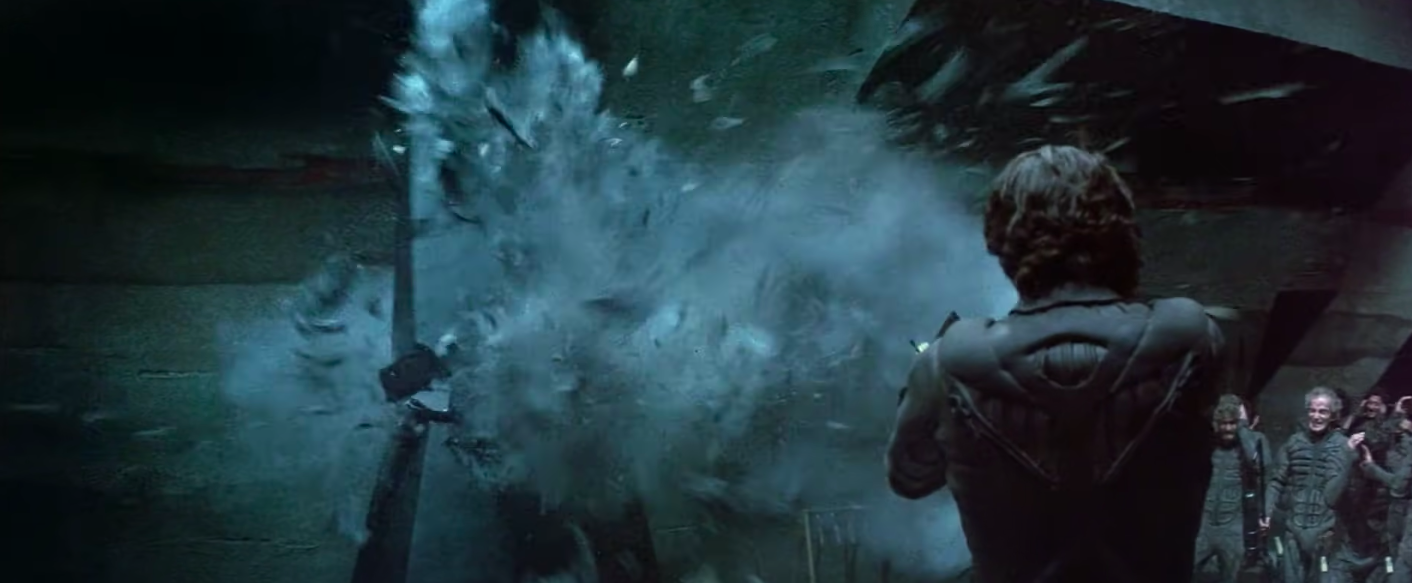 Ka-blammo!
Ka-blammo!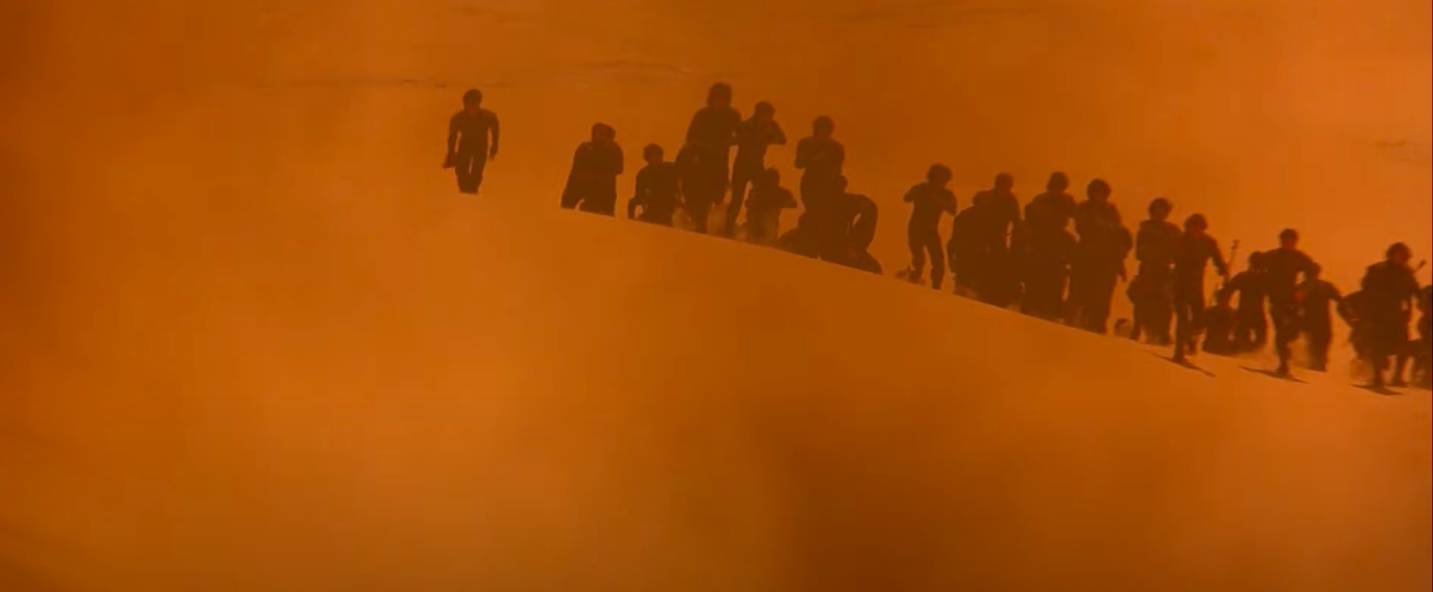 Paul leads his soldiers into battle.
Paul leads his soldiers into battle.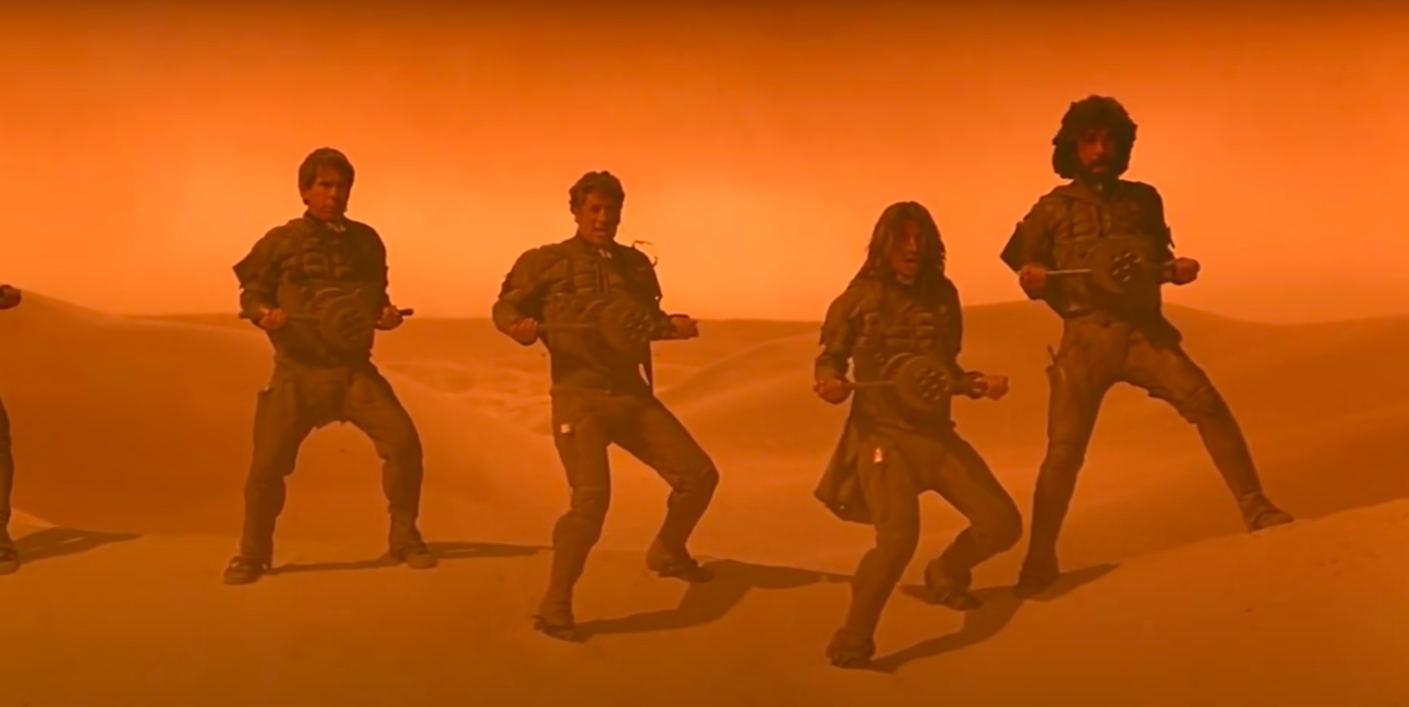 So much about this image is right and true.
So much about this image is right and true.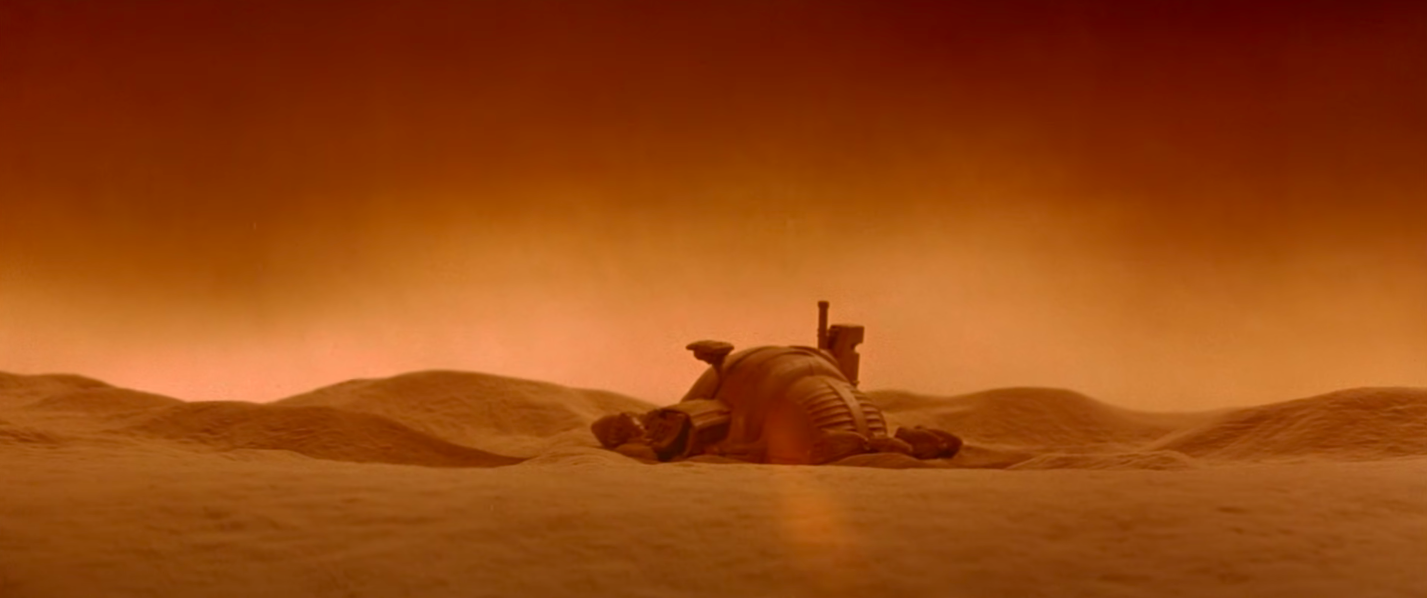 Oh, that's a nice little sand-rover thingy, it would be too bad if someone—
Oh, that's a nice little sand-rover thingy, it would be too bad if someone—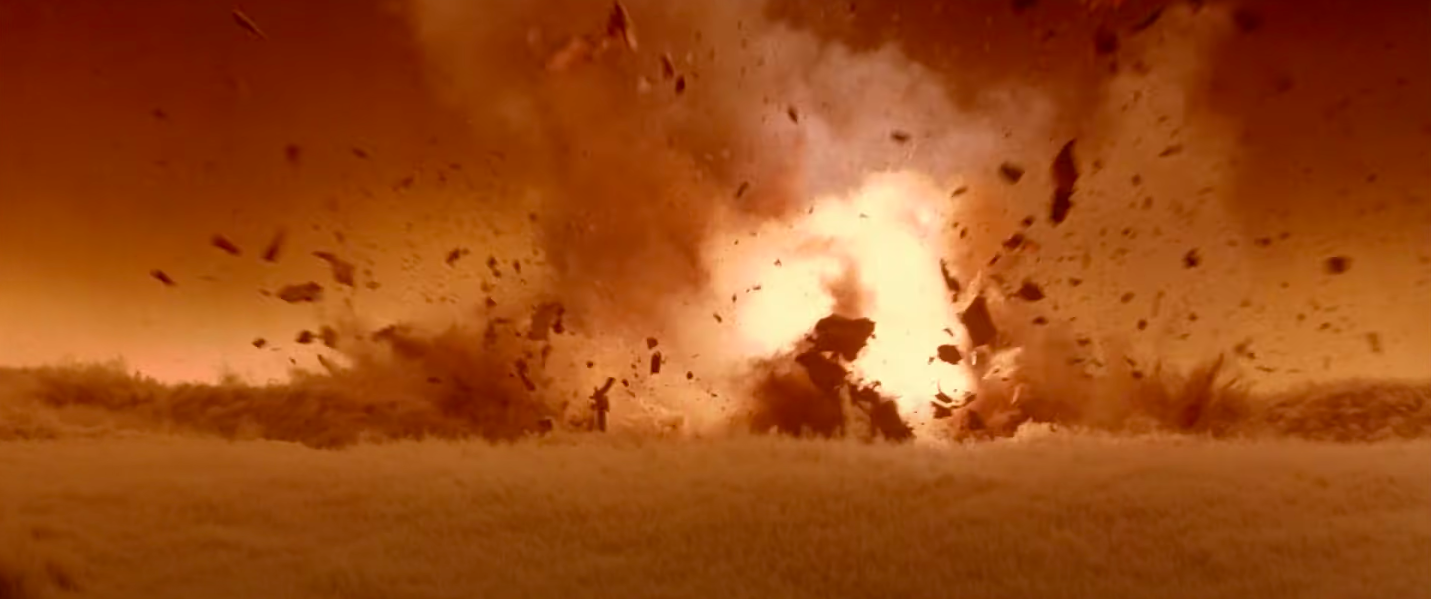 —WEIRDING WAY! Ha ha, you suck.
—WEIRDING WAY! Ha ha, you suck.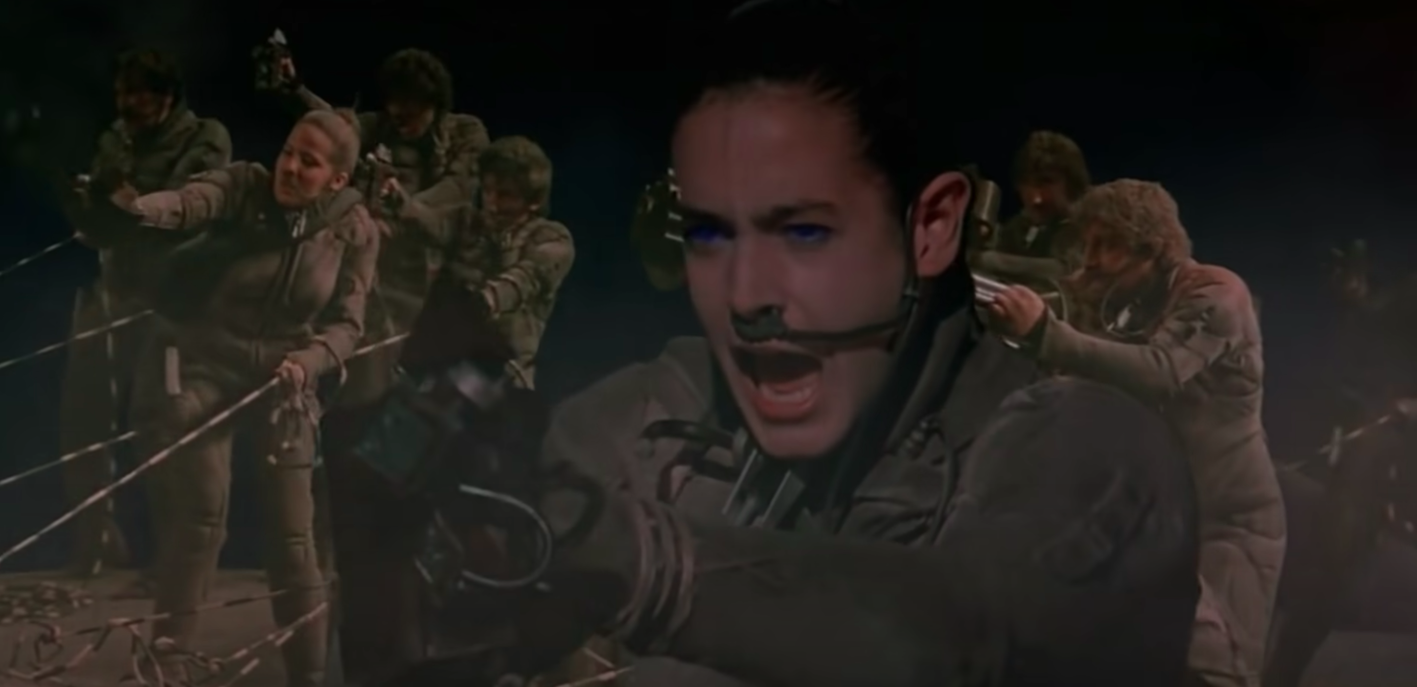 Modern audiences might not enjoy this much rear-projection. Whatever—their loss.
Modern audiences might not enjoy this much rear-projection. Whatever—their loss.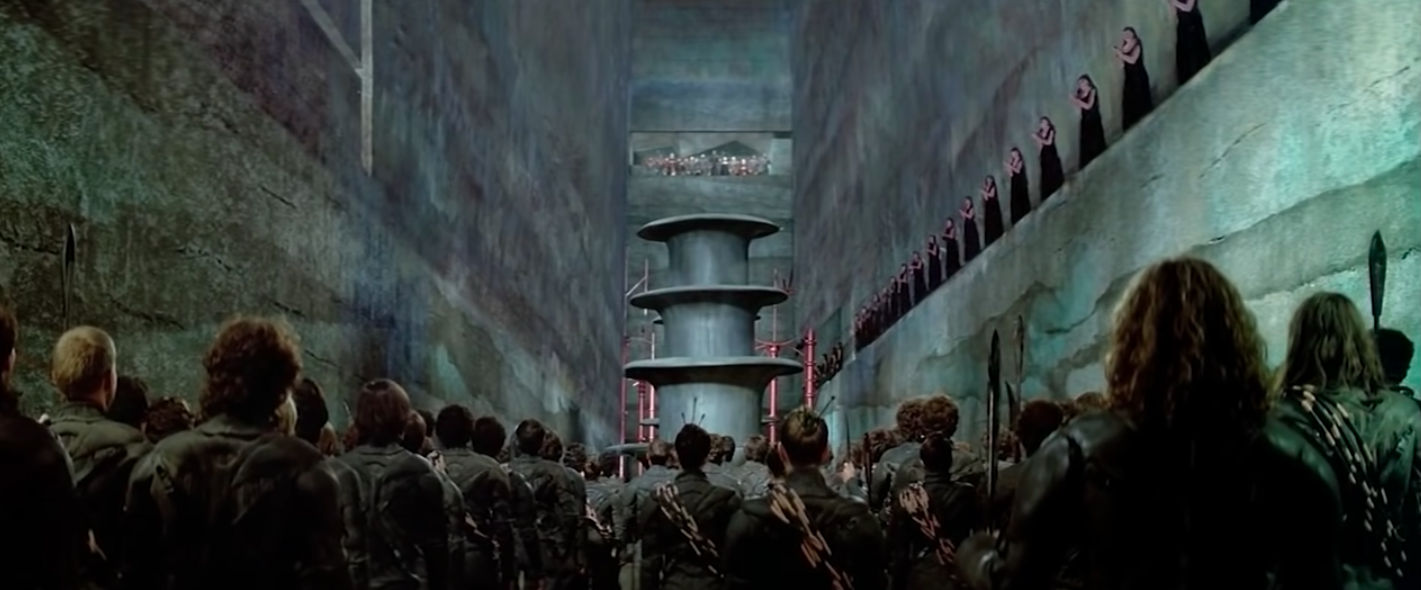 Paul gathers his boys.
Paul gathers his boys.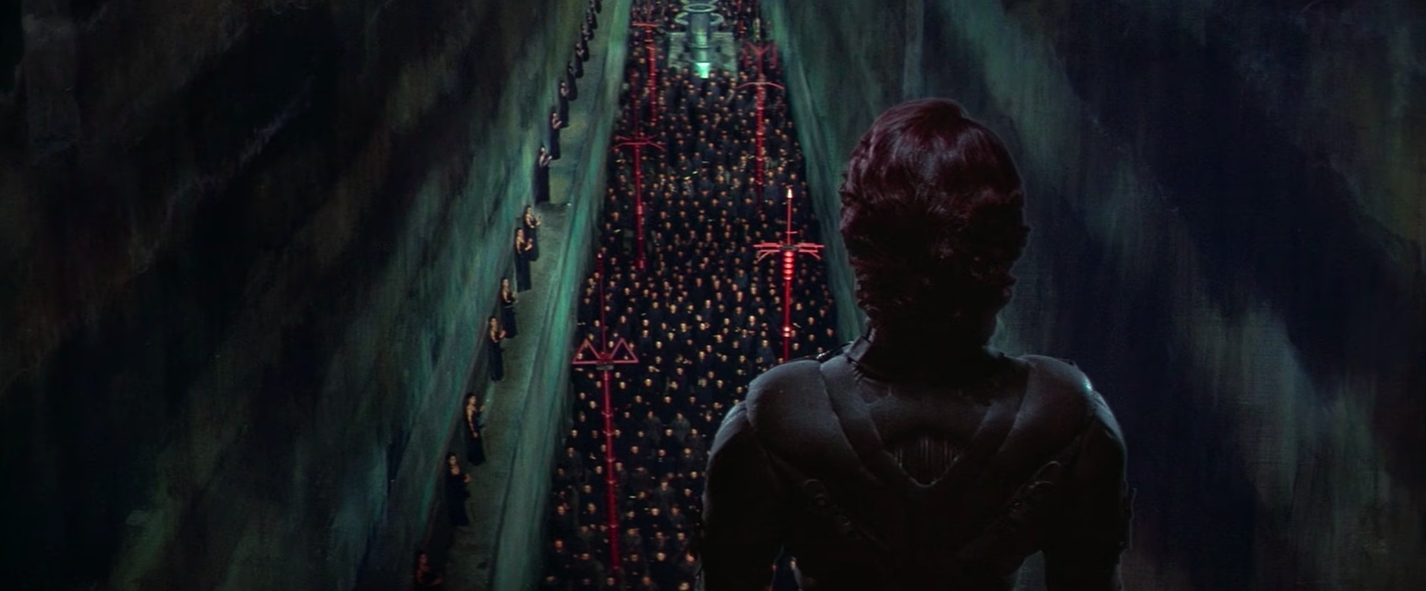 "Have any of you seen my keys?"
"Have any of you seen my keys?"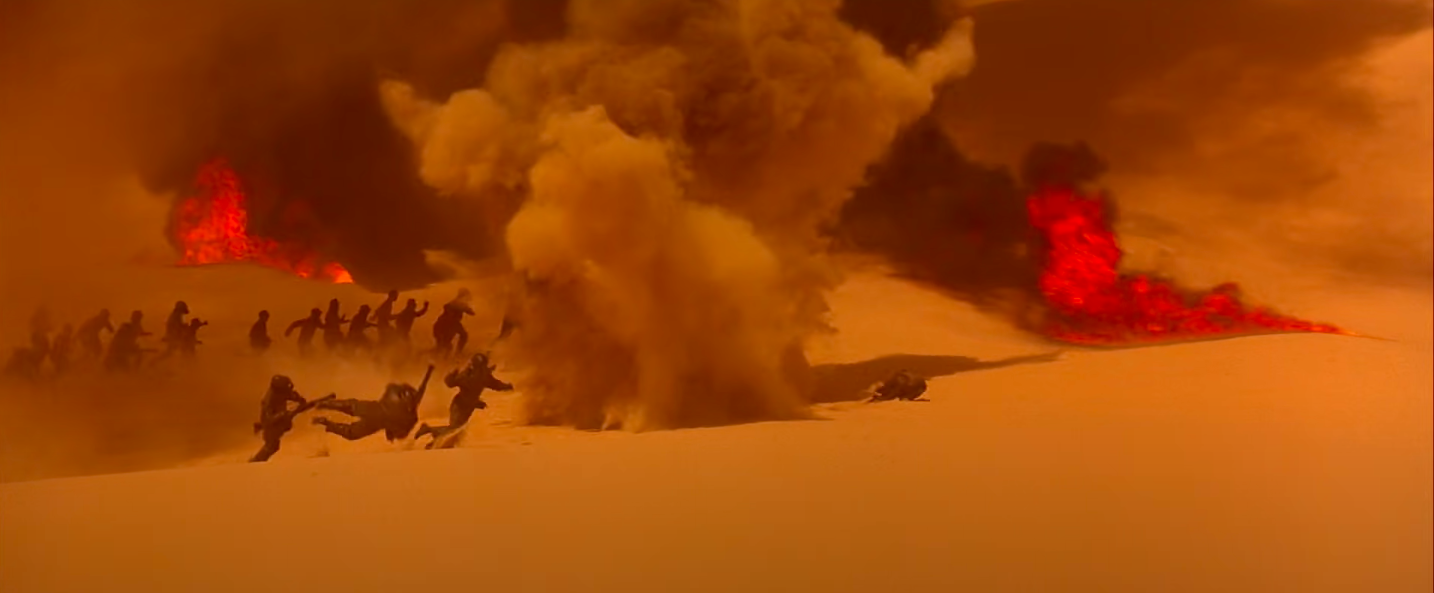 The final showdown to retake the temple-refinery thing.
The final showdown to retake the temple-refinery thing.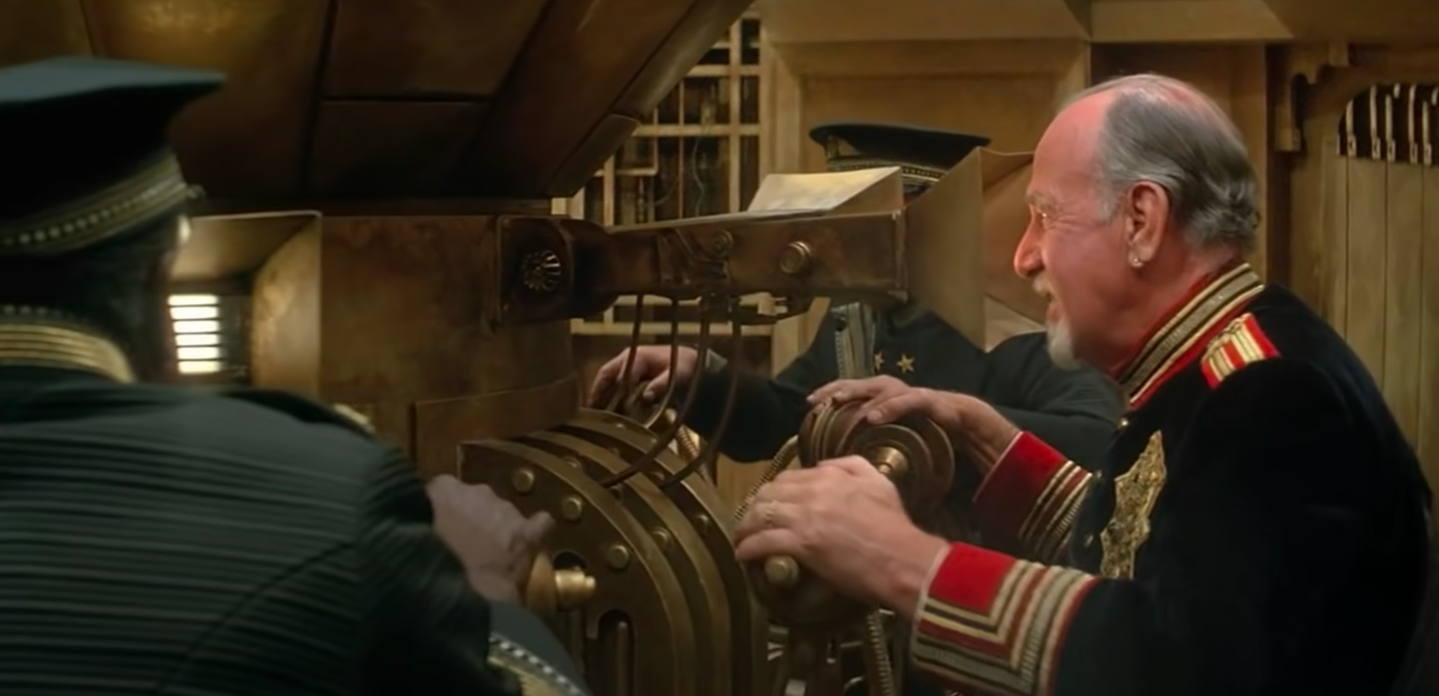 The Emperor (who is now on Dune) ain't too happy. This steampunk periscope doohickey rotates for no discernible purpose. I love this movie.
The Emperor (who is now on Dune) ain't too happy. This steampunk periscope doohickey rotates for no discernible purpose. I love this movie.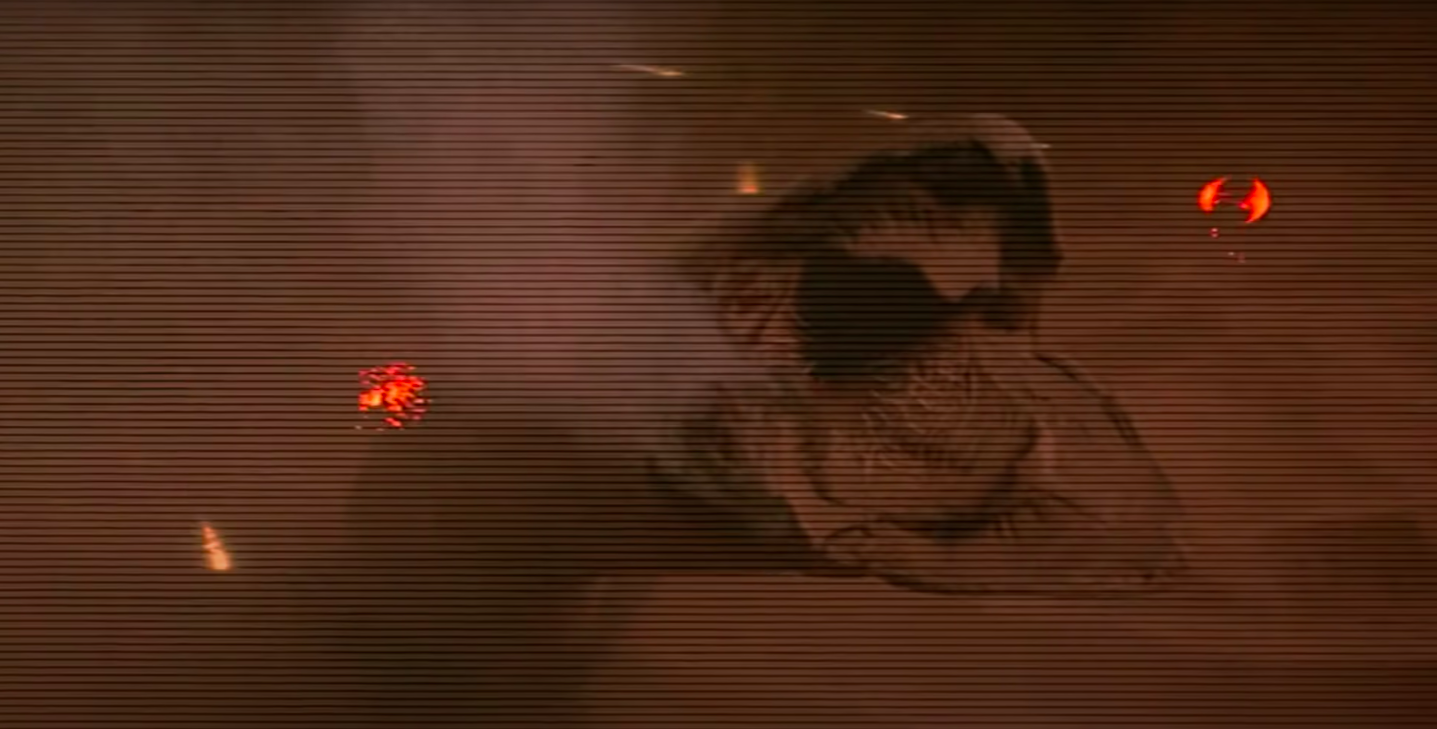 How the fray looks from the periscope's POV. Paul brought worms.
How the fray looks from the periscope's POV. Paul brought worms.
“Know then that it is the year 10,191”
The number of different cuts of Dune shown in movie theaters and on TV, both in the US and abroad, is baffling, and only some of them bear Lynch's imprimatur. Go to IMDb if you want to have your brain liquefied for use in a stillsuit. For this piece, I watched the 137-minute theatrical release because I heard it was the most confounding. In it, two households, both alike in dignity, are vying for control of the desert planet Dune. Why? Because Dune is the only place where you can mine Spice, the only substance in the universe that can fold space and allow your baroquely ornate spaceship to travel anywhere in the cosmos instantly. No Spice, no space empire.
The film opens with the "good" family (the Atreides) and its entourage on their totally-opposite-of-Dune water planet, preparing to trek off to Dune to take over running the place. The Atreides patriarch is played by craggy-faced German Jürgen Prochnow of Das Boot fame. At the time, Prochnow had just finished making... let me look this up... Michael Mann's The Keep?! Prochnow is a legend.
But the real hero is Atreides heir Paul. He's played by the forever-innocent Kyle MacLachlan, who went on to collaborate with Lynch in Blue Velvet and Twin Peaks. Unfortunately for the Atreides, the Emperor of the Known Universe (Jose Ferrer) has made a deal with the "bad" family (the Harkonnen, a pack of nasty-ass perverts plus Sting). Also, there's something about space nuns with shaved heads and Paul being The Chosen One. Because this is David Lynch, the hum and hiss of unseen machinery pervades most scenes.
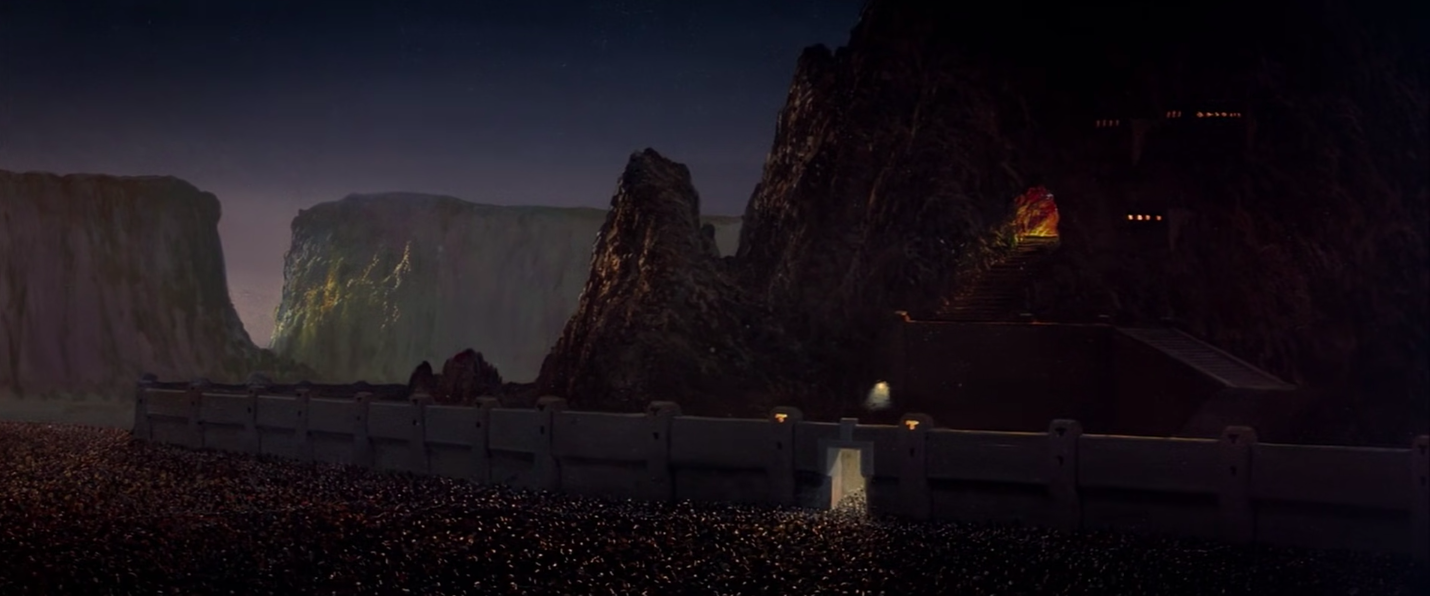 The people of Dune flood the temple-refinery or whatever it's called.
The people of Dune flood the temple-refinery or whatever it's called.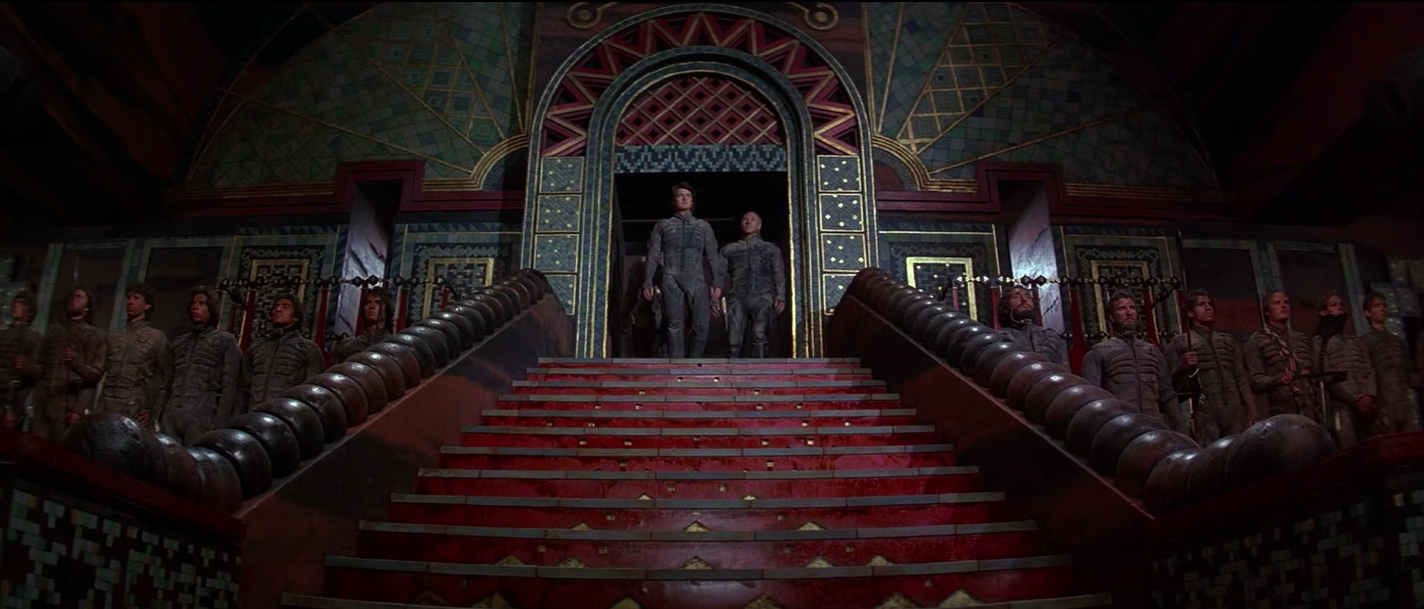 Paul et al. enter Final Boss Level.
Paul et al. enter Final Boss Level.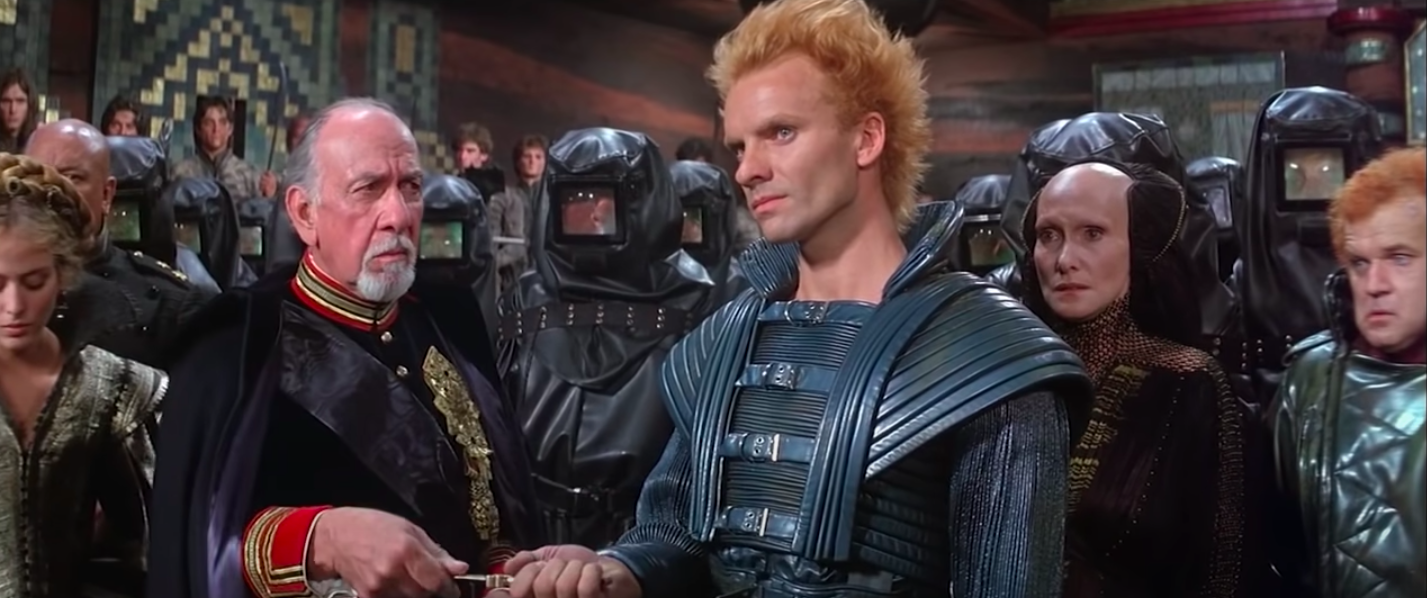 Sting is not having it, though.
Sting is not having it, though.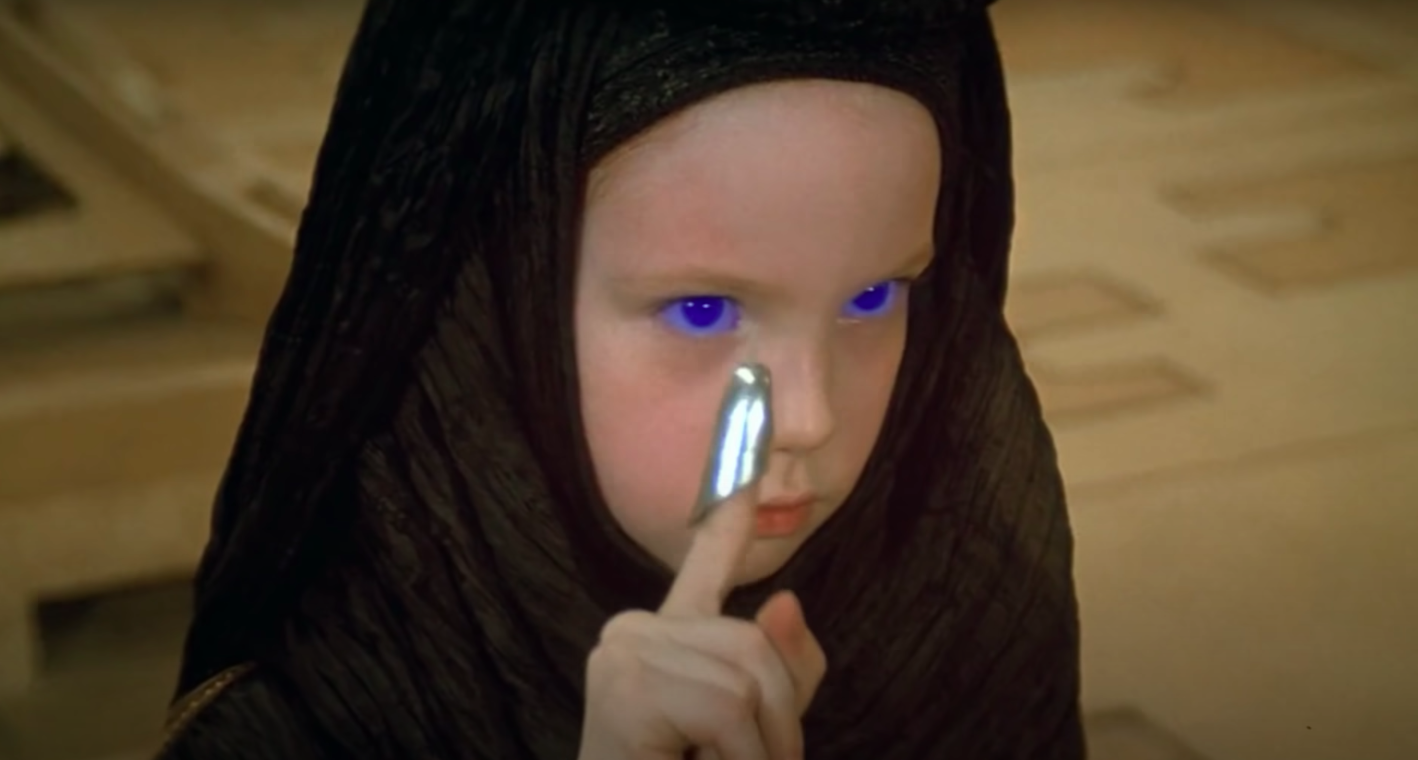 "I'll be right here, Elliott."
"I'll be right here, Elliott."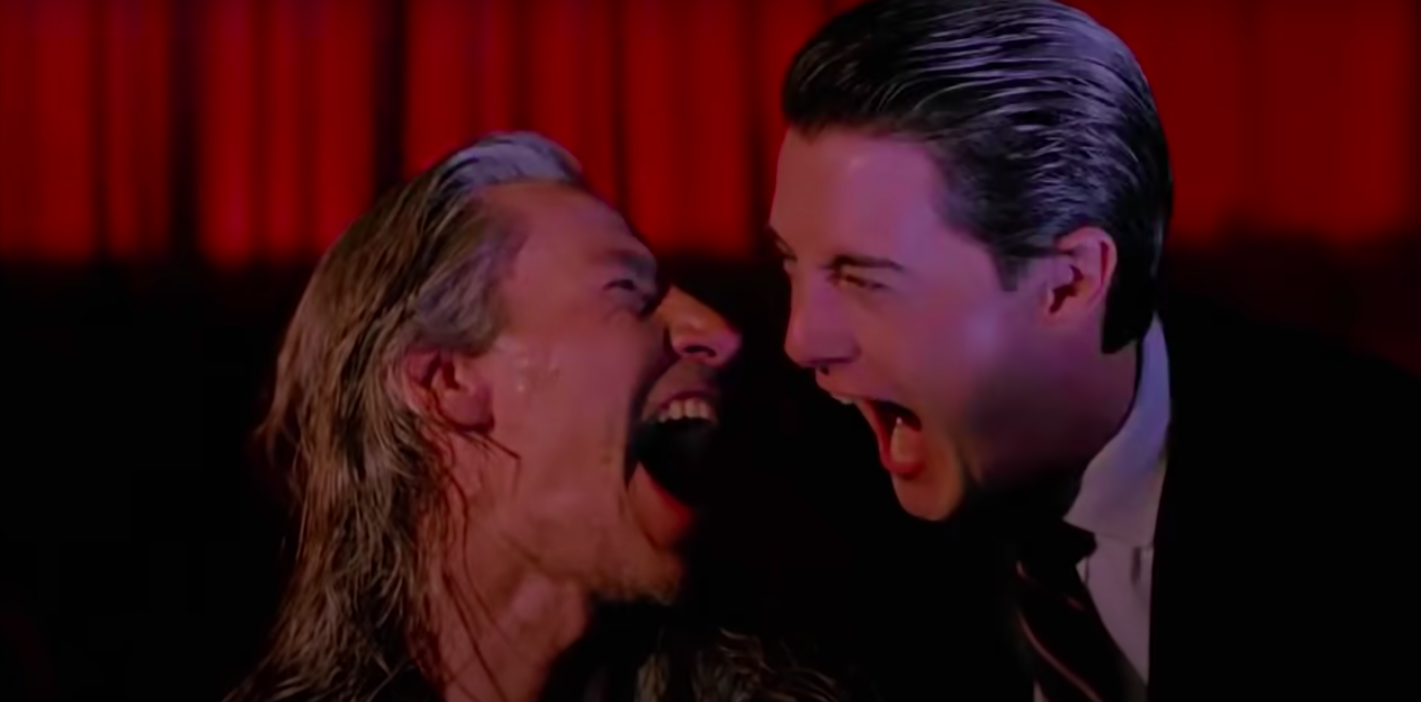 Dune flopped like a walrus trying to get a tummy rub from a zookeeper, but Lynch got the last laugh.
Dune flopped like a walrus trying to get a tummy rub from a zookeeper, but Lynch got the last laugh.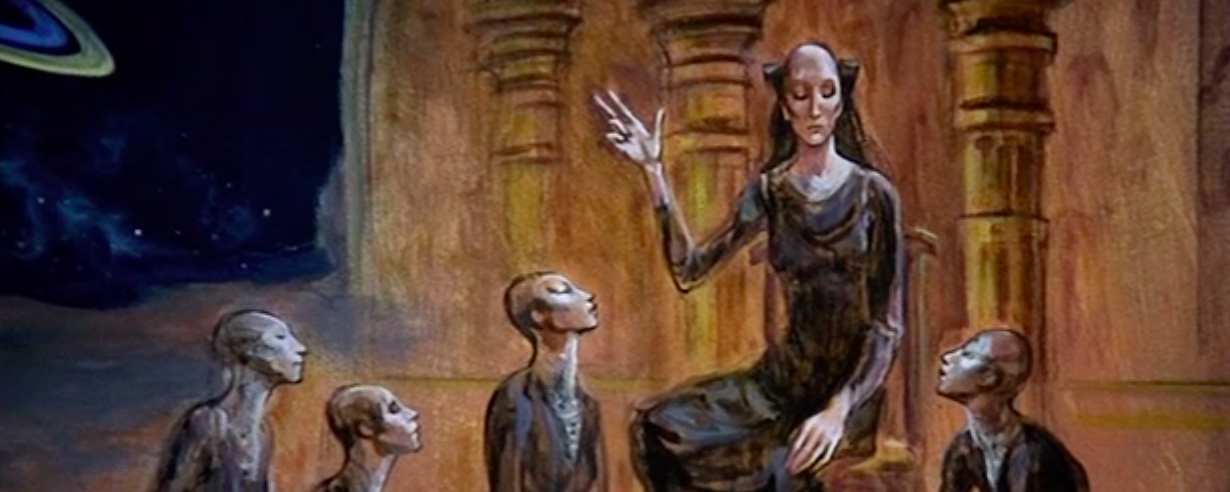 The longer TV version of Dune begins with seven additional minutes of hand-drawn images and voiceover covering the 8,000 years leading up to the movie. You can watch that cut if you want to understand more of what's going on—I don't judge.
The longer TV version of Dune begins with seven additional minutes of hand-drawn images and voiceover covering the 8,000 years leading up to the movie. You can watch that cut if you want to understand more of what's going on—I don't judge.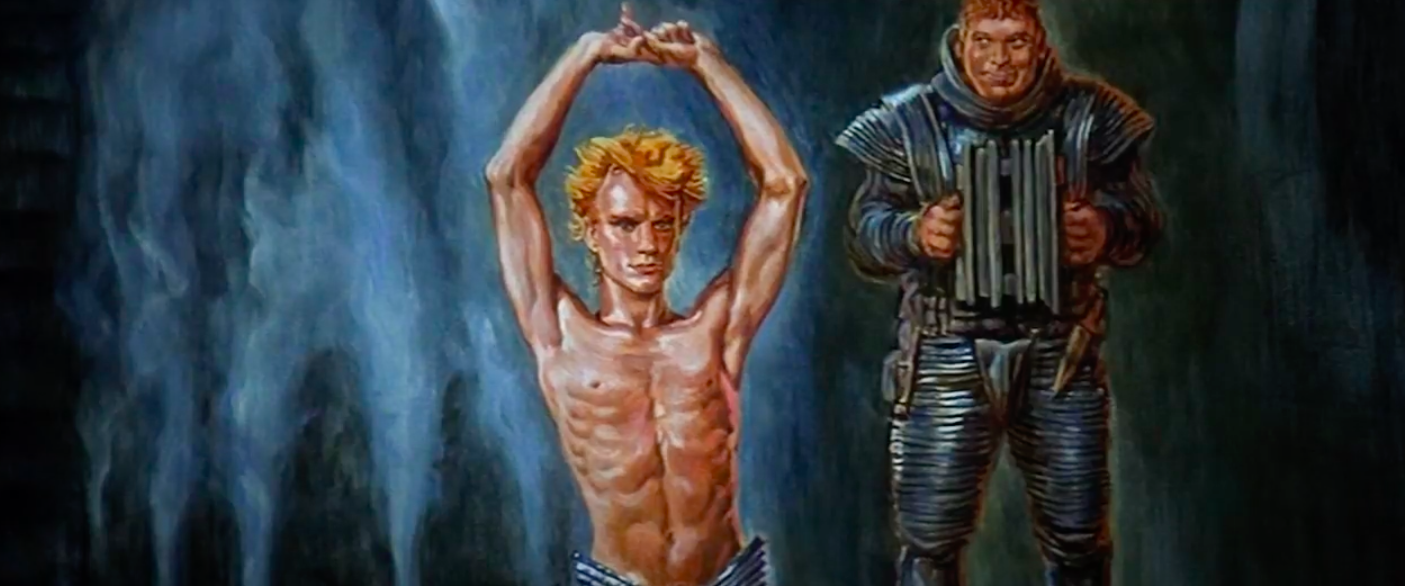 Srsly though, I love that these are in the style of Amazing Stories and other Golden Age sci-fi rags. More movies should use drawings to cover narrative gaps.
Srsly though, I love that these are in the style of Amazing Stories and other Golden Age sci-fi rags. More movies should use drawings to cover narrative gaps.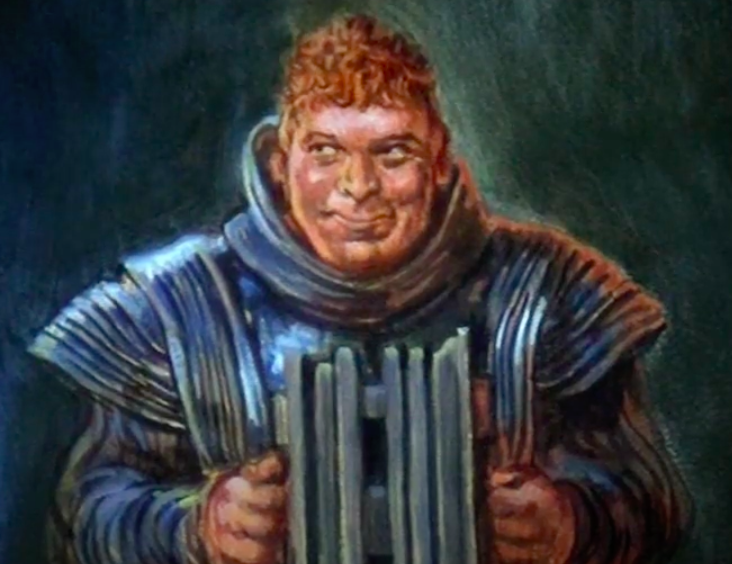 LOL.
LOL.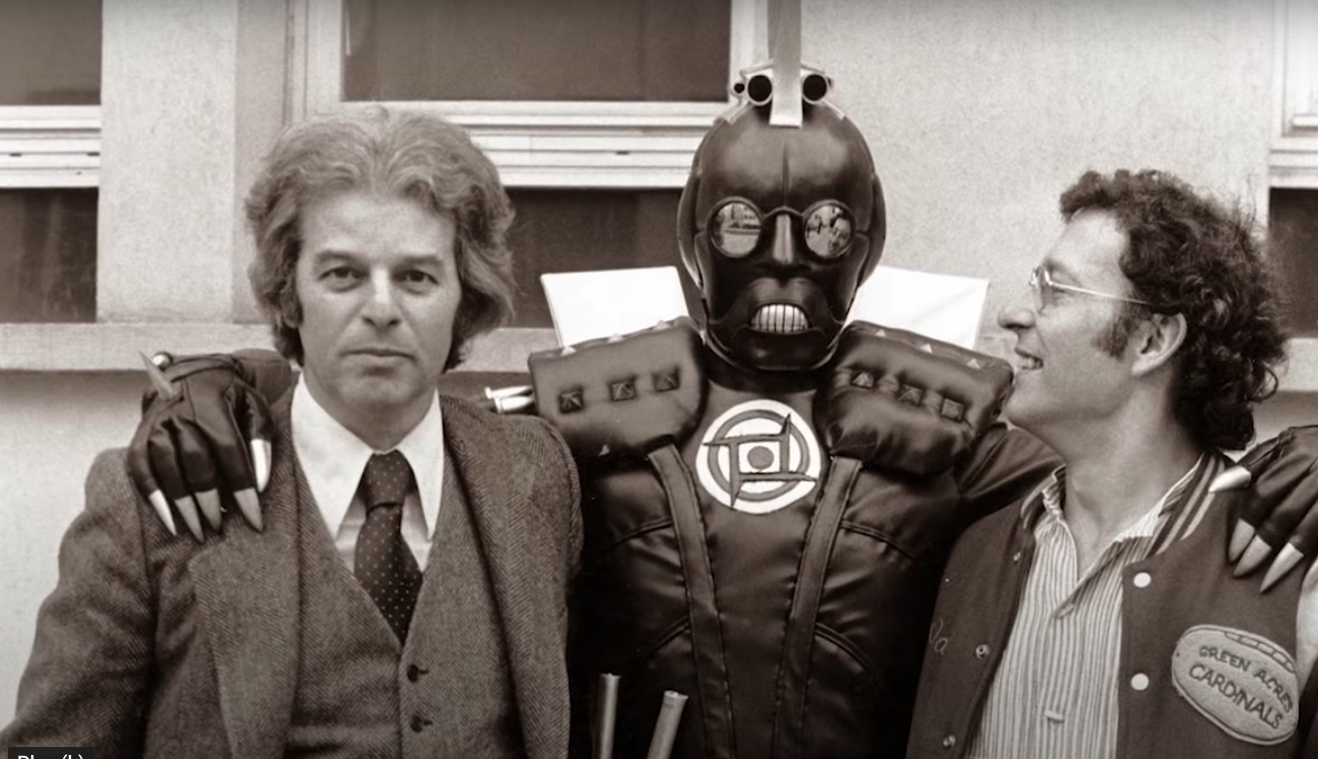 Jodorowsky's Dune (2013) chronicles filmmaker Alejandro Jodorowsky's (on the left) failed attempt to film Dune in the 1970s. It would have been bananas.
Jodorowsky's Dune (2013) chronicles filmmaker Alejandro Jodorowsky's (on the left) failed attempt to film Dune in the 1970s. It would have been bananas.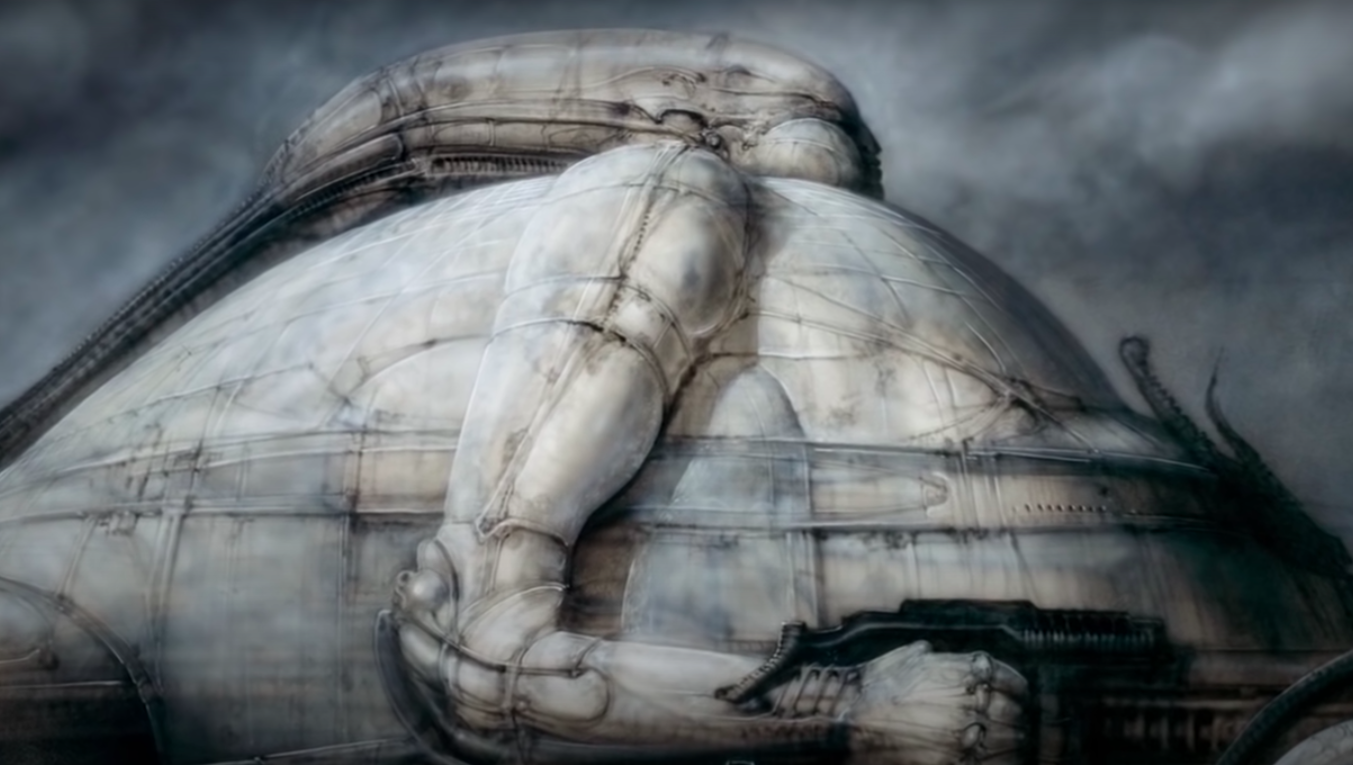 Here's a preproduction sketch for Jodorowsky's Dune by H.R. Giger of Alien fame.
Here's a preproduction sketch for Jodorowsky's Dune by H.R. Giger of Alien fame.
“The slow blade”
Much hoopla surrounds a fellow named Duncan Idaho (the always-reliable Richard Jordan) reuniting with the Atreides, probably because the name "Duncan Idaho" slaps. He gets a knife to the face about five minutes later when the Harkonnen attack. Someone has betrayed the Atreides in order to get revenge on "a man." Do we ever find out who that man is? I'm not sure. The important thing is that we get multiple close-ups of the traitor's mouth saying, "The tooth, the tooth," which is rad because the traitor is Admiral Al Calavicci rocking a perv-stache.
Many Atreides warriors go into battle wearing glowing energy suits, but the suits' weakness is that "the slow blade pierces the shield." (Even though a third of Dune's dialogue is Homestar-level gibberish, the movie is still a quote factory.) The movie also features Captain Picard, whose weapon of a choice is a pug and who later grows out a wicked skullet.
After fleeing into the desert with his mom (Francesca Annis, on the verge of shaving her head and eyebrows), Paul teams up with the indigenous population of Dune. Their eyes glow blue from so much contact with the Spice. Speaking of Twin Peaks, Big Ed from Twin Peaks (Everett McGill) is the indigenous leader. Paul's love interest (Sean Young, fresh from Blade Runner) emerges from the ether. Together, they lead a labor strike to stop production of the Spice (raised-fist emoji). But first, they must ride giant sandworms because—well, because it's awesome.
The Spice strike brings the universe to its knees. Paul teaches his army to use voice guns. And—I can't stress this enough—hard men with glowing blue eyes spontaneously pound drums during a vaguely erotic knife fight between Paul and Sting. The victor is the one who randomly remembers a Bible quote. Also, Paul now has a rapidly aging baby sister who might be pure evil, played by 8-year-old Alicia Witt. The score by Toto—synths and strings and horns and guitars cranked to 11—is why God gave us ears.
At the end, my wife turned to me and said, "It was less confusing than Tenet."
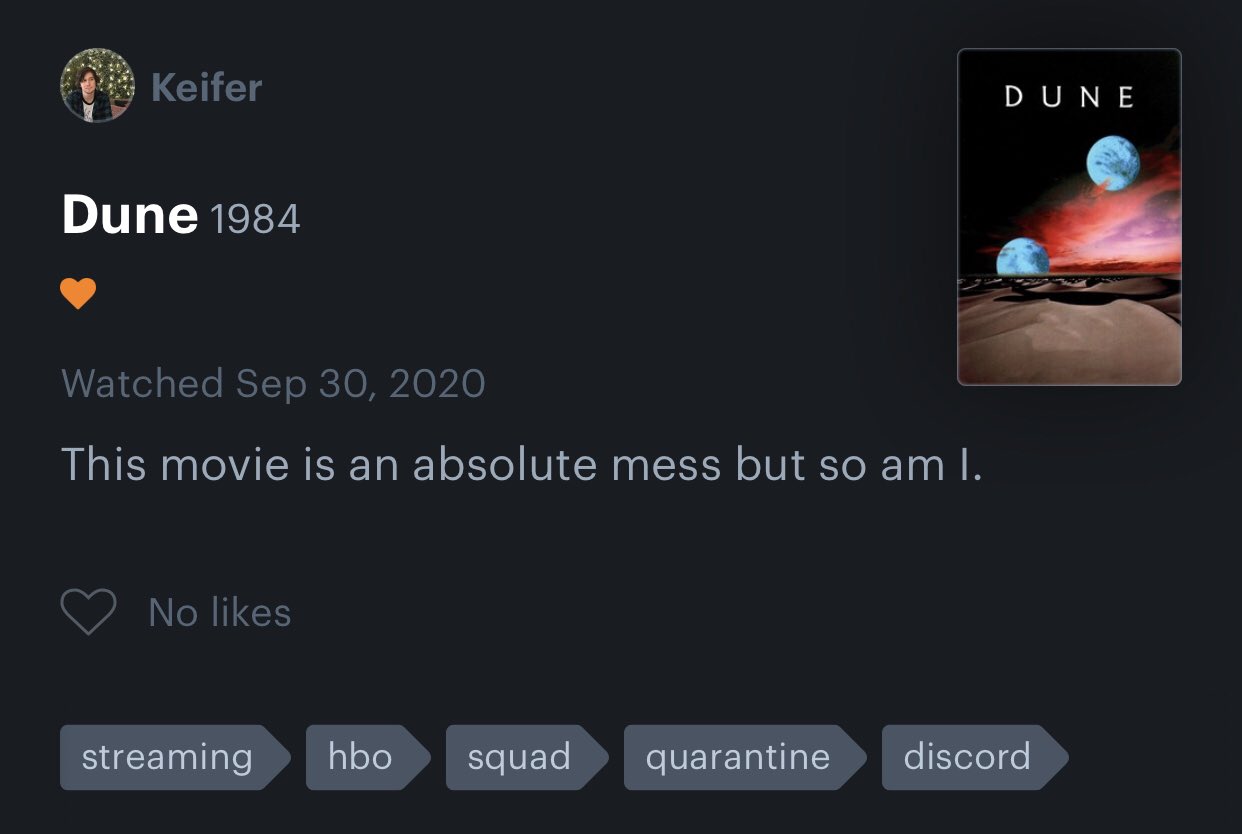 Teh Intarwebz has some Hot Taekz on Dune.
Teh Intarwebz has some Hot Taekz on Dune.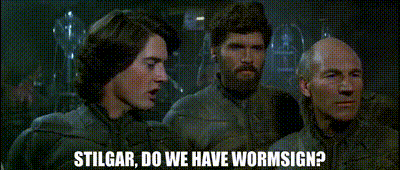 Actual dialogue from the movie Dune.
Actual dialogue from the movie Dune.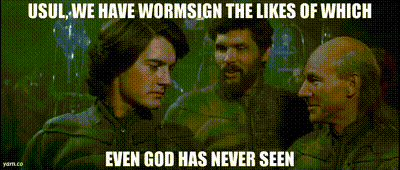 I'm glad we cleared that up (this movie is a meme-printing machine).
I'm glad we cleared that up (this movie is a meme-printing machine).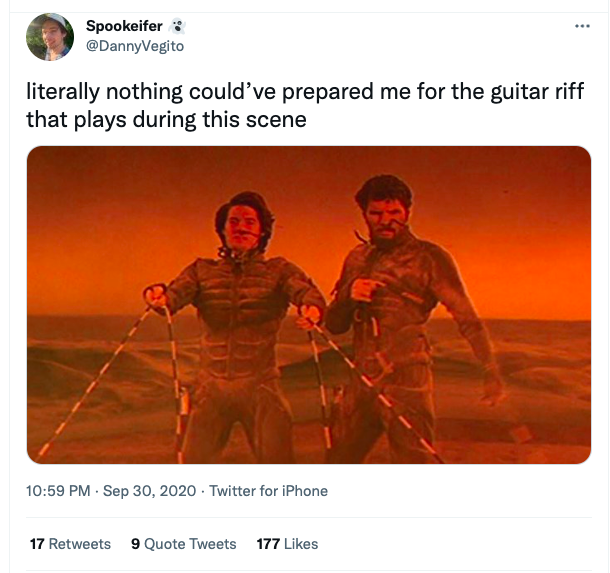 This dude gets it.
This dude gets it.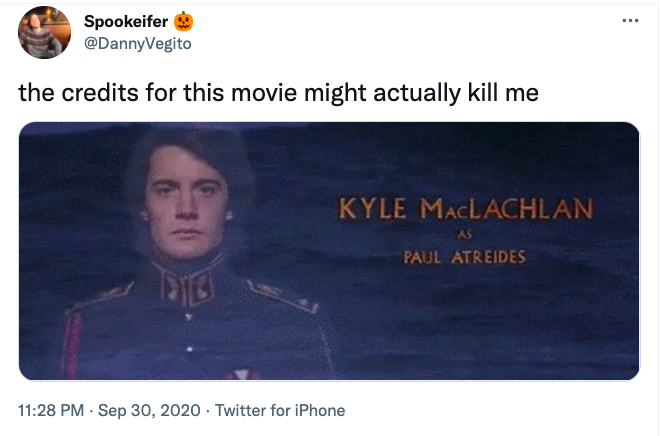
Not a normal movie for normal people
I have faith in Denis Villeneuve and his new version of Dune starring Timothée Chalamet. But it will probably be a normal movie for normal people, in which characters with recognizable emotions talk in a recognizable way and move through a plot we understand to achieve clearly defined goals. Which is all fine and good, but how likely is it to inspire sick beats for '90s kids doing ecstasy?
Listing image by Universal Pictures
"movie" - Google News
October 18, 2021 at 02:00AM
https://ift.tt/3ARaiYO
Before the new version, let's revisit 1984's Dune—the greatest movie ever made - Ars Technica
"movie" - Google News
https://ift.tt/35pMQUg
https://ift.tt/3fb7bBl
Bagikan Berita Ini














0 Response to "Before the new version, let's revisit 1984's Dune—the greatest movie ever made - Ars Technica"
Post a Comment